Feed aggregator
ARC Giveaway Winner
Happy New Year, Horde! May we devour the bestest books in peace and happiness!

We started the year in style, with an outpouring of love for our favourite stories in thousands upon thousands of comments from all over the world.
It falls on me to announce the luckiest amongst us: the winner of the ARC list spot for all Ilona Andrews fiction for the year 2025, who is going to get an early manuscript of Maggie and whatever else will be written by House Andrews this year.
Greatest Prize WinnerSher Crumbley
December 31st at 3:33 am
I love most of the books and series but the book I listen to on repeat and that gets me giddy is Magic Rises. I love the mystery of Curran’s behavior, Kate’s reactions and interactions with Hugh, and the emotional roller coaster of resolution and loss I experience.
I will contact Sher privately with details and arrangements about their prize, from the modr@ilona-andrews.com address on the email they provided with their comment. If we do not hear back from you by Wednesday, January 8th, 2025 at 12:00 pm Central, we will chose a different winner in your place, so please keep an eye on the blog and your inbox.
For the rest of us, the w*it will be hard and our p*tience tried, but maybe…not as tried as we might think.
I know Ilona and Gordon have surprises and even more giveaways in store and they have no intention to stop feeding the beloved Horde with more amazing stories and characters this year.
So in the famous words of the song I totally made up just now:
Chernys do it, nechists do it,
Even educated Koo-kos do it
Let’s do it!
Let’s be chalaaaaaaaaaant!
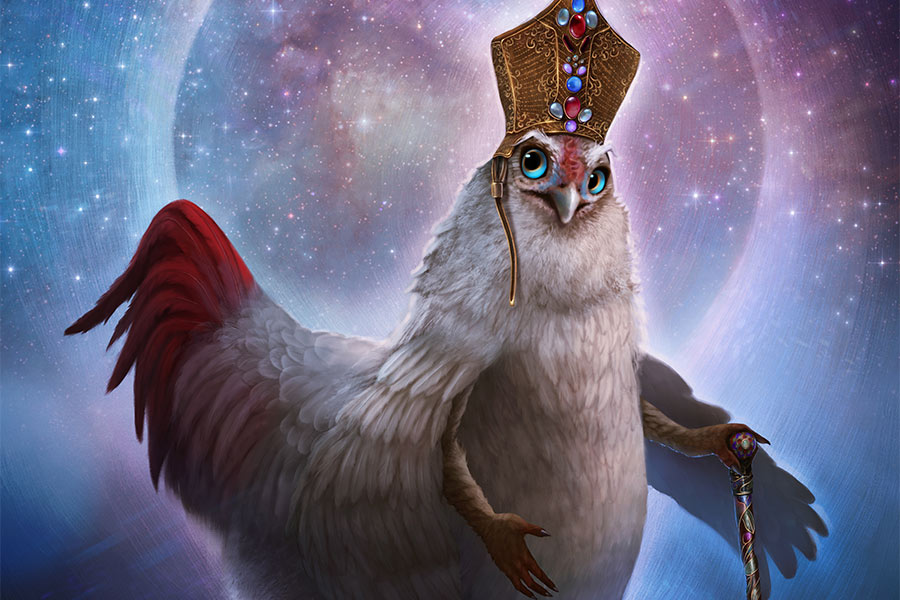
The post ARC Giveaway Winner first appeared on ILONA ANDREWS.
Comment on Into 2025 by Richard
Hi Benedict,
love the Inheritance of Magic series so far!
I’m especially looking forward to your articles on corporations – maybe with some hints as to how the corporations manage to keep Drucraft more or less secret from the general public, despite so many of their employees constantly using Drucraft on a global scale?
Happy new year!
Comment on Into 2025 by Adam
Hi, happy to hear that you are starting with book 4 of Inheritance of Magic series.
I just finished the Alex Verus series in German and I absolutely loved it. It is my favourite book series of all time. Thanks
Looking forward to buy the first book of the Inheritance of Magic series in German when it releases this march.
Happy new year to everyone ❤️
A to Z Reviews: “Wasted Potential,” by David Lee Zweifler
 Over the past several years, I’ve embarked on a series of year-long review cycles at Black Gate. In 2018, I reviewed a story-a-day to coincide with an author whose birthday it was. In 2022, I selected stories completely at random from my collection to review. In both of those cases, the projects served to find forgotten and minor works of science fiction that spanned a range of years. They also served to make me read stories and authors who I haven’t read before, even if they were in my collection.
Over the past several years, I’ve embarked on a series of year-long review cycles at Black Gate. In 2018, I reviewed a story-a-day to coincide with an author whose birthday it was. In 2022, I selected stories completely at random from my collection to review. In both of those cases, the projects served to find forgotten and minor works of science fiction that spanned a range of years. They also served to make me read stories and authors who I haven’t read before, even if they were in my collection.
For this year’s project, I’ve compiled a list of all the stories and novels in my collection. I then identified the first and last works for each letter of the alphabet and over the next twelve months, I’ll be looking at those works of fiction, starting with Vance Aandahl’s “Bad Luck” and ending with David Lee Zweifler’s “Wasted Potential.” Looking at the 52 works (two for each letter), I find that I’ve only reviewed one of the works previously. Interestingly, given the random nature of the works, only three novels made the list, while four anthologies have multiple stories on the list. The works range in publication date from 1911’s “The Hump,” by Fernan Caballero to Zweifler’s story from 2023.
After a year, we finally come to the end of the alphabet, with David Lee Zweifler’s “Wasted Potential,” which was published in the November/December 2023 issue of Analog.
 Cover by 123rf
Cover by 123rf
After being laid off from his job as head of product for a fruit-flavored diet carbonated beverage, Elliott has hit the job market, using the newest technological advances to find the perfect job for himself. Unfortunately, the promise of quantum computing, which should make the job search (and everything else in life) easier, is not functioning the way Elliott would like it to.
The training videos promise exciting jobs, such as space piracy, interstellar zoo seeping, and other off-world adventures. Elliott’s own job searches are offering payroll, management, and billing positions in such hotspots as Cleveland, Waco, and Cairo, the one in Indiana, not even the one in Egypt. The dichotomy of the promises and the reality only leave him dissatisfied and wanting more.
Even worse, it makes him feel as if he is holding his girlfriend, Daphne, back from achieving her own potential. The wasted potential of the title, therefore, is not only his own, but also what he is doing to the woman he loves.
Zweifler offers an interesting conceit, but what makes the story successful is that he doesn’t take any of it too seriously. Elliott’s accidental deactivation of the microphone on his speaker means that the only way he has to communicate it through his AI coffeemaker, which has a lower opinion of Elliott and his potential than Elliott does.
While the humor of the piece doesn’t always work, it is present throughout as Zweifler offers a satirical look at job searches, AI, and instruments that are meant to make our lives easier. Perhaps Zweifler is aiming at too many targets or perhaps the humor exhibited isn’t quite biting enough to offer a sting. Humor, of course, is subjective and at the very least, he offers the story with a lighthearted touch throughout.
His character’s job search includes nice homages to Robert A. Heinlein’s Starship Troopers and Frank Herbert’s Dune.
And that ends my series for 2024. I’ll be taking a short break from the pages of Black Gate, returning with the start of a new series of articles at the end of February.
 Steven H Silver is a twenty-time Hugo Award nominee and was the publisher of the Hugo-nominated fanzine Argentus as well as the editor and publisher of ISFiC Press for eight years. He has also edited books for DAW, NESFA Press, and ZNB. His most recent anthology is Alternate Peace and his novel After Hastings was published in 2020. Steven has chaired the first Midwest Construction, Windycon three times, and the SFWA Nebula Conference six times. He was programming chair for Chicon 2000 and Vice Chair of Chicon 7.
Steven H Silver is a twenty-time Hugo Award nominee and was the publisher of the Hugo-nominated fanzine Argentus as well as the editor and publisher of ISFiC Press for eight years. He has also edited books for DAW, NESFA Press, and ZNB. His most recent anthology is Alternate Peace and his novel After Hastings was published in 2020. Steven has chaired the first Midwest Construction, Windycon three times, and the SFWA Nebula Conference six times. He was programming chair for Chicon 2000 and Vice Chair of Chicon 7.
T.H. White’s Legacy on Contemporary Television
 Ted Lasso (Warner Bros. Television/Apple TV+, 2020-2023)
Ted Lasso (Warner Bros. Television/Apple TV+, 2020-2023)
I recently re-watched Ted Lasso, and as I took in the final episode, I was reminded quite forcibly of The Queen’s Gambit. The question was, why? I quickly cued up The Queen’s Gambit, and sure enough, my memory held true: both shows employ what I like to call — what I am going to call, starting here, with this essay –– the T.H. White Stratagem.
If I may explain. The T.H. White Stratagem (a clear misnomer, since to my knowledge he deployed it only once) stems from the climax of The Sword in the Stone, book one of The Once and Future King. If you haven’t read this wonderful masterwork, please skip the remainder of this essay, and come back later. For those that have read TOFK, recall that in London, at the great tournament, (Sir) Kay dispatches the Wart to run back and get his sword, which Kay has foolishly left back at the hostel.
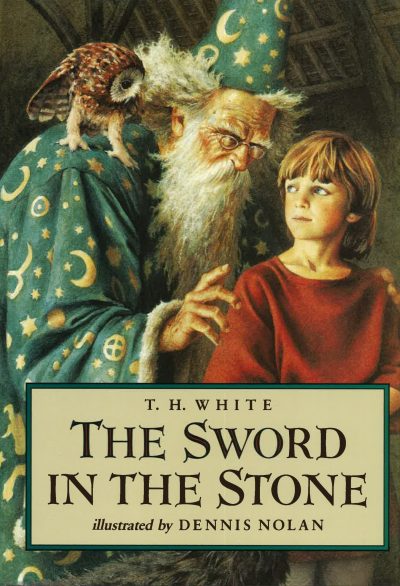 The Sword in the Stone by T.H. White (Viking Books Illustrated edition, September 15, 1993). Illustrated by Dennis Nolan.
The Sword in the Stone by T.H. White (Viking Books Illustrated edition, September 15, 1993). Illustrated by Dennis Nolan.
Off trots the Wart, but in an echo of the New Testament, he finds, so to speak, no room at the inn: the door is locked. Desperate for a sword, any sword, the Wart discovers one in a chapel, with various banners arrayed on the high walls above. The sword, of course, is the sword, the Sword in the Stone (it’s also driven through an anvil, which never gets talked about), but the Wart doesn’t realize its importance. He just knows he needs to procure a sword, so he does his best to pull the blade free.
He fails.
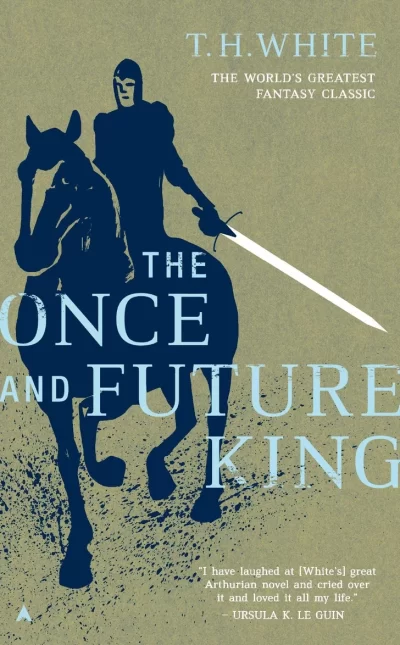 The Once and Future King by T.H. White (Ace Books, November 1, 2011)
The Once and Future King by T.H. White (Ace Books, November 1, 2011)
But then, the various creatures depicted on the banners ringing the room animate and begin proffering essential advice. Each is a representation of one of the many mentors the Wart met while growing up, each served up by Merlin with the goal of providing the Wart with the best possible education, that being the wisdom of the animal kingdom.
As the Wart keeps tugging, all his old friends summate their teachings, reminding the Wart of what he already knows: to use his back, and his brain, and to never give up. And with this chorus of boon companions cheering him on, from pike to badger and back again, the Wart at last succeeds; he yanks the sword free, and in so doing, becomes who he was always meant to be: Arthur Rex, ruler of Britain, the Once and Future King.
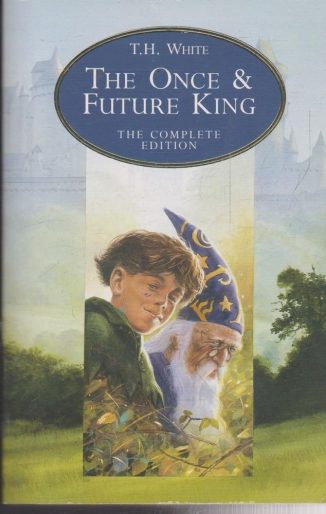 The Once and Future King by T.H. White (HarperCollins UK, December 1996). Cover by John Howe
The Once and Future King by T.H. White (HarperCollins UK, December 1996). Cover by John Howe
It’s an astonishing sequence. The first time I read it, I felt as if I’d been plugged into to an electric outlet; my hair all but stood on end. To have all those animals reappear, and so magically, so unexpectedly, and each of them standing ready to assist? Overwhelming. It was then and remains today an ecstatic piece of writing.
No surprise, then, that the formula of disparate friends who fall out of the narrative only to return to offer crucial support at a key moment has been absorbed by others, and put to good use.
In Ted Lasso, as Ted tries to close out his final match with a win, the show surrounds him with fans, from the pub faithful to the team’s former sports psychologist and all the way across the ocean to his ex, and his young son. The message is clear: Ted Lasso can’t win on his own. No one can. We get by with a little help from our friends.
 The Queen’s Gambit by Walter Tevis (Netflix, October 23, 2020)
The Queen’s Gambit by Walter Tevis (Netflix, October 23, 2020)
The Queen’s Gambit concludes with Beth Harmon at a chess tournament behind the Iron Curtain, in Moscow, but as with Coach Lasso and the unassuming Wart, she needs help from afar, and her friends (dare I say frenemies) rise to the challenge, coaching her through a rough patch over the telephone and, in one case, showing up in person (surprise!) to lend an ear.
A final example jumps to mind, from Star Trek: the Next Generation, and what many believe to be the show’s best episode, “The Inner Light.” Captain Picard winds up living an entire second life on a planet whose civilization has long since been doomed to extinction, and as his “story” there concludes, the deceased family and friends that he’s made along the way reappear for an emotional, benedictory send-off. As in TOFK, the hero can only succeed when surrounded by the support of steadfast mentors.
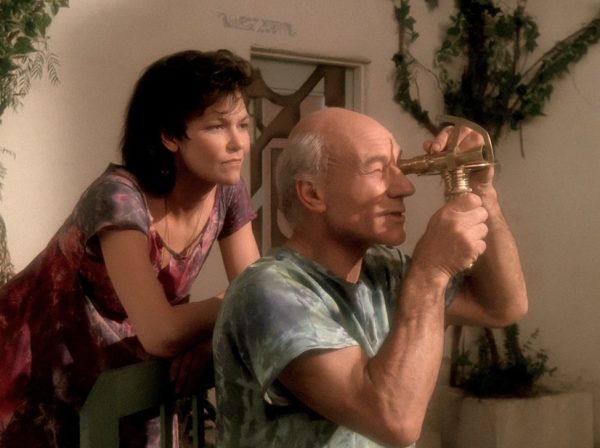 Star Trek: The Next Generation: “The Inner Light” by Morgan Gendel and Peter Allan Fields (Paramount Television, June 1, 1992)
Star Trek: The Next Generation: “The Inner Light” by Morgan Gendel and Peter Allan Fields (Paramount Television, June 1, 1992)
In thinking about the T.H. White Stratagem, it occurs to me that it functions as something like the inverse of the “assemble your team” plots exemplified by The Seven Samurai (or, if you prefer westerns, The Magnificent Seven). In these story-lines, the gathering-up of guides and fellow travelers dominates the proceedings, until by the end, the company splinters apart.
Unlike the White Stratagem, there is no culminating moment in which all that latent support coalesces around a single focal point, the all-important hero. Instead, the team works together toward a common rather than an individual end. But, both schemes certainly involve the mustering of allies, and are therefore inherently related.
 Seven Samurai (Toho, April 26, 1954)
Seven Samurai (Toho, April 26, 1954)
What I have not been able to bring to mind are other novels that either lean on or pre-date The Once and Future King, and also employ the T.H. White Stratagem. As a narrative device, it strikes me as so successful that it would be frankly incredible if it had not been used over and over –– and yet, nothing jumps to mind, not even The Book of Merlyn, since in that extraordinary coda to TOFK, the animal chorus is present throughout.
Perhaps you, Gentle Reader, can fill in some blanks and suggest examples?
Onward.
Mark Rigney is a writer and long-time Black Gate blogger. His work on this site includes original fiction and perennially popular posts like “Adventures in Spellcraft: Rope Trick.” His new novel, Vinyl Wonderland, dropped on June 25th, 2024. Reviewer Rich Horton said of Vinyl Wonderland, “I was brought to tears, tears I trusted. A lovely work.” His favorite review quote so far comes from Instagram: “Holy crap on a cracker, it’s so good.” A preview post can be found HERE, while his website lives over THERE.
Cast by Flames is now in Kindle Unlimited
New Year’s Musings: Good To Be Back
The keyboard feels strange beneath my fingers. That’s how long it’s been. My typing is rusty — typos come with almost every word. But I am writing. Something, anything. I am writing. Again, finally.
It’s been two months since I wrote so much as a blog entry. I haven’t written a word of fiction since the earliest days of April. I haven’t started a book that was entirely my own (as opposed to tie-in/work-for-hire) in way more than a year. For a long time now, I have wondered if I am still a writer, or have become someone who used to write. On that last, I suppose, time will tell.
But for now, I am writing this, and I thank you for coming back to my site to read it.
The year just passed began with grief, in a dark, painful place that seemed inescapable. It ended differently, and while we all continue to miss our beloved Alex, we are, all of us, on a healing path.

Young male lion, Greater Kruger National Park, photo by David B. Coe
Nancy and I traveled a good deal in 2024, including two epic trips, one to Italy and one to South Africa. We stayed with friends in the Pacific Northwest, visited Nancy’s family in Idaho, spent time with Erin in Colorado, and traveled several times to the Hudson Valley in New York for real estate purposes.

Venice. Photo by David B. Coe
Those last trips bore fruit, and I write this today from my new computer table, in my new office, in our new home, in upstate New York. Since mid-August, we have been busy nonstop with travel, but also with cleaning, throwing away old stuff that we no longer needed or wanted, packing, moving, unpacking, painting the new place, and, of course, dealing with banks and title agencies, etc., etc., etc.

View of our new house from the back yard
We are settling in, though there are still plenty of boxes sitting here and there, unopened, hiding things we need or want or simply have forgotten about. Our new house is smaller than the old one, and so we have downsized a bit (hence the culling of possessions before the move) and it is in need of a little TLC. But we like it very much, and we LOVE the setting — six-plus acres with a small pond, fruit trees, a view of Taconic Mountains, and plenty of open space for gardening. Nancy envisions a wildflower meadow up near the pond, a vegetable garden nearer the house, and flower beds all around. We have a pair of Great Horned Owls living nearby, a huge flock of turkeys that passes through the yard now and then, and a local Cooper’s Hawk who seems eager for us to put up bird feeders to bring in his next meals.
Erin came for Christmas and the start of Hanukkah and stayed with us for a week. We feared she would not warm to the new house. The one we sold was the only family home she had ever known. On the other hand, all of us found the old house too full of memories and sadness. We were all ready for a change. And it turns out that Erin likes the new place a lot, which made us very happy.
So, we have traveled, we have moved, we have grieved and processed and taken time to begin healing. What is next?
That’s a fairly easy question for Nancy, who, as of midnight on New Year’s is officially retired. She has so many interests and hobbies — gardening, knitting, making music, drawing, writing, reading, and — her latest — weaving. She will have no trouble keeping busy and enjoying this next phase of her life.
I have been asked repeatedly whether I am retiring as well.
I am not.
I miss writing. I miss diving into a new world, a new narrative, the hearts and minds of new characters. I miss my editing work. And after a year of . . . well . . . other stuff, I feel ready to get back to all of it. I don’t know yet what my next project will be. I know that I have spoken often of reissuing my Winds of the Forelands series, and I still intend to do that. I have spoken of writing new Thieftaker books. I would like to do that as well. I would love to return to the Fearsson and Radiants worlds. I have an idea for a new Chalice War project. And I have ideas for things unrelated to anything I’ve written before. And yes, I fully intend to begin taking on new editing clients in the near future.
With one exception, I don’t yet know what conventions I will be attending this year. The exception is ConCarolinas in Charlotte, May 30 through June 1. I will definitely be at that one.
I hope to see many of you in person during the coming year. And I hope as well to be blogging on a more regular basis now that we are settling into our new digs.
Happy 2025 to all of you. It’s good to be back.
DBC
New Year’s Musings: Good To Be Back
The keyboard feels strange beneath my fingers. That’s how long it’s been. My typing is rusty — typos come with almost every word. But I am writing. Something, anything. I am writing. Again, finally.
It’s been two months since I wrote so much as a blog entry. I haven’t written a word of fiction since the earliest days of April. I haven’t started a book that was entirely my own (as opposed to tie-in/work-for-hire) in way more than a year. For a long time now, I have wondered if I am still a writer, or have become someone who used to write. On that last, I suppose, time will tell.
But for now, I am writing this, and I thank you for coming back to my site to read it.
The year just passed began with grief, in a dark, painful place that seemed inescapable. It ended differently, and while we all continue to miss our beloved Alex, we are, all of us, on a healing path.
 Young male lion, Greater Kruger National Park, photo by David B. Coe
Young male lion, Greater Kruger National Park, photo by David B. Coe
Nancy and I traveled a good deal in 2024, including two epic trips, one to Italy and one to South Africa. We stayed with friends in the Pacific Northwest, visited Nancy’s family in Idaho, spent time with Erin in Colorado, and traveled several times to the Hudson Valley in New York for real estate purposes.
 Venice. Photo by David B. Coe
Venice. Photo by David B. Coe
Those last trips bore fruit, and I write this today from my new computer table, in my new office, in our new home, in upstate New York. Since mid-August, we have been busy nonstop with travel, but also with cleaning, throwing away old stuff that we no longer needed or wanted, packing, moving, unpacking, painting the new place, and, of course, dealing with banks and title agencies, etc., etc., etc.
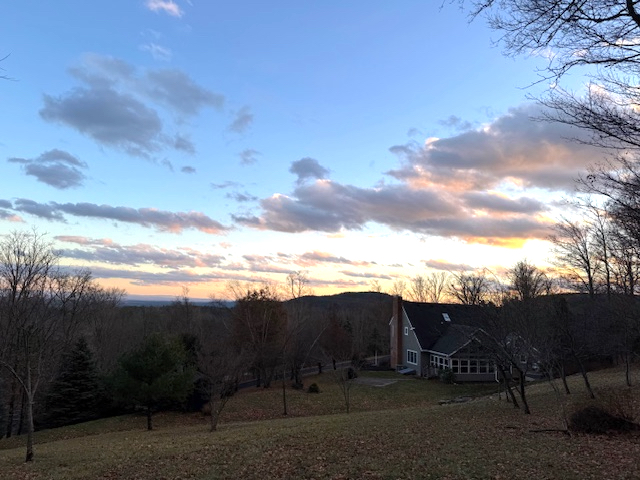 View of our new house from the back yard
View of our new house from the back yard
We are settling in, though there are still plenty of boxes sitting here and there, unopened, hiding things we need or want or simply have forgotten about. Our new house is smaller than the old one, and so we have downsized a bit (hence the culling of possessions before the move) and it is in need of a little TLC. But we like it very much, and we LOVE the setting — six-plus acres with a small pond, fruit trees, a view of Taconic Mountains, and plenty of open space for gardening. Nancy envisions a wildflower meadow up near the pond, a vegetable garden nearer the house, and flower beds all around. We have a pair of Great Horned Owls living nearby, a huge flock of turkeys that passes through the yard now and then, and a local Cooper’s Hawk who seems eager for us to put up bird feeders to bring in his next meals.
Erin came for Christmas and the start of Hanukkah and stayed with us for a week. We feared she would not warm to the new house. The one we sold was the only family home she had ever known. On the other hand, all of us found the old house too full of memories and sadness. We were all ready for a change. And it turns out that Erin likes the new place a lot, which made us very happy.
So, we have traveled, we have moved, we have grieved and processed and taken time to begin healing. What is next?
That’s a fairly easy question for Nancy, who, as of midnight on New Year’s is officially retired. She has so many interests and hobbies — gardening, knitting, making music, drawing, writing, reading, and — her latest — weaving. She will have no trouble keeping busy and enjoying this next phase of her life.
I have been asked repeatedly whether I am retiring as well.
I am not.
I miss writing. I miss diving into a new world, a new narrative, the hearts and minds of new characters. I miss my editing work. And after a year of . . . well . . . other stuff, I feel ready to get back to all of it. I don’t know yet what my next project will be. I know that I have spoken often of reissuing my Winds of the Forelands series, and I still intend to do that. I have spoken of writing new Thieftaker books. I would like to do that as well. I would love to return to the Fearsson and Radiants worlds. I have an idea for a new Chalice War project. And I have ideas for things unrelated to anything I’ve written before. And yes, I fully intend to begin taking on new editing clients in the near future.
With one exception, I don’t yet know what conventions I will be attending this year. The exception is ConCarolinas in Charlotte, May 30 through June 1. I will definitely be at that one.
I hope to see many of you in person during the coming year. And I hope as well to be blogging on a more regular basis now that we are settling into our new digs.
Happy 2025 to all of you. It’s good to be back.
DBC
1st Edition Spotlight | “Dancing Woman” by Elaine Neil Orr
Literary LitStackers, listen up! Another beauty, Dancing Woman by Elaine Neil Orr, is ready for…
The post 1st Edition Spotlight | “Dancing Woman” by Elaine Neil Orr appeared first on LitStack.
Happy 2025 and Challenge Update

Time to see how I've done last year with my challenges.
So let's start by saying that 2024 was a total WTF?! year for us. So reading was one of the things suffering from that as you may have noticed by the lack of reviews.
We finished 60 books in 2024.24 of those were rereads.6 were Orphans,4 of them were from 2023, 1 from 2021, and 1 from 'how and were did I even get this?'.
My series challenge:Series:Karma Marx duology: Done!House Immortal trilogy: Done!Dark Swan series: Done!Jessie Shimmer trilogy: 1 read, 2 to goSouls of Fire series: DNFEsther Diamond series: 2 read, 3 in my TBR, 2 to track down
Well... We didn't do too bad on these.
We decided to stop with Souls of Fire because we seriously disliked the main love interest. We liked the other two friends with benefits and couldn't stand the heroine thirsting after a real big jerk, while two perfectly fine men wear there for her.So for 2025 we'll try to get 12 Orphaned books off the TBR. Which should be easy with how the TBR pile is big!
We will also keep working on those two series we haven't finished yet.

Some of the books we read in 2024I decided to not chase after reviews and start afresh in 2025, but feel free to poke me if you're curious about my thoughts.

Happy 2025 to all and Happy Reading.
The Sword & Planet Fiction of Robert Moore Williams: Zanthar
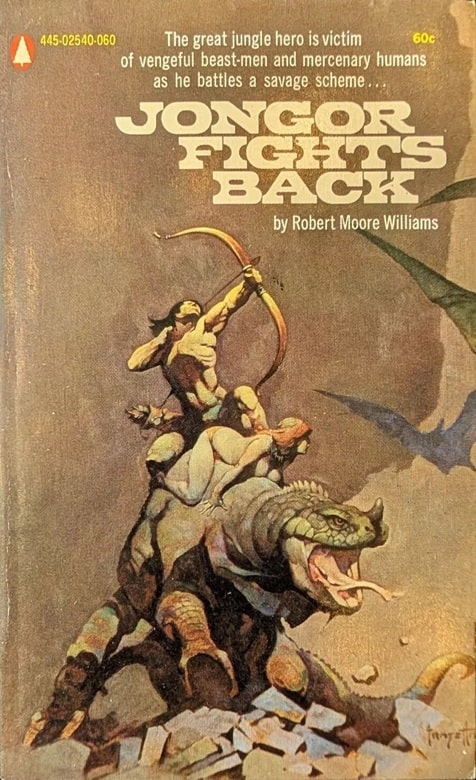
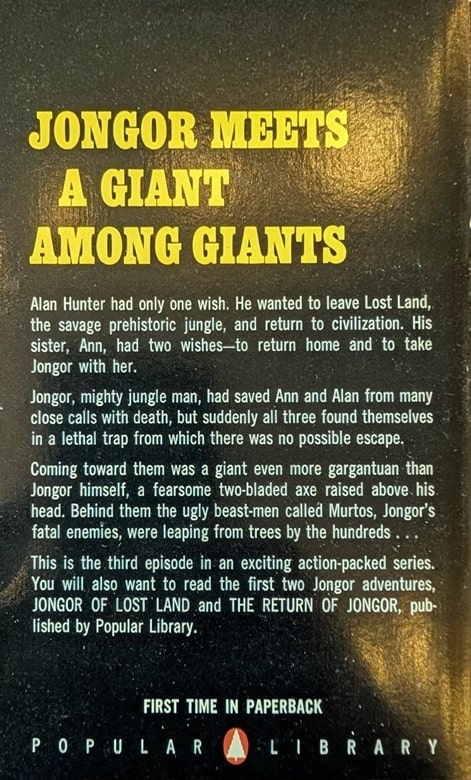
Jongar Fights Back (Popular Library, 1970). Cover by Frank Frazetta
Robert Moore Williams (1907 – 1977) wrote a lot of books, over 100. I’ve read two of them and that means there’s a 100 or so more books out there I won’t need to read before I die, including the ones he wrote under pseudonyms such as John Browning, H. H. Harmon, E. K. Jarvis, and Russell Storm. He also wrote an autobiography called Love is Forever – We Are for Tonight.
As a writer myself, I hesitate to be too critical of other writers. I know how difficult it is to finish a novel. But I don’t know how else to say it other than that — in my opinion — Moore was not a good one. The first book I found by him was Jongar Fights Back, a Tarzanesque effort featuring Jongar in a lost land. It was readable, but just barely. The cover, by Frank Frazetta, was a million times better.
[Click the images for Tarzan-sized versions.]
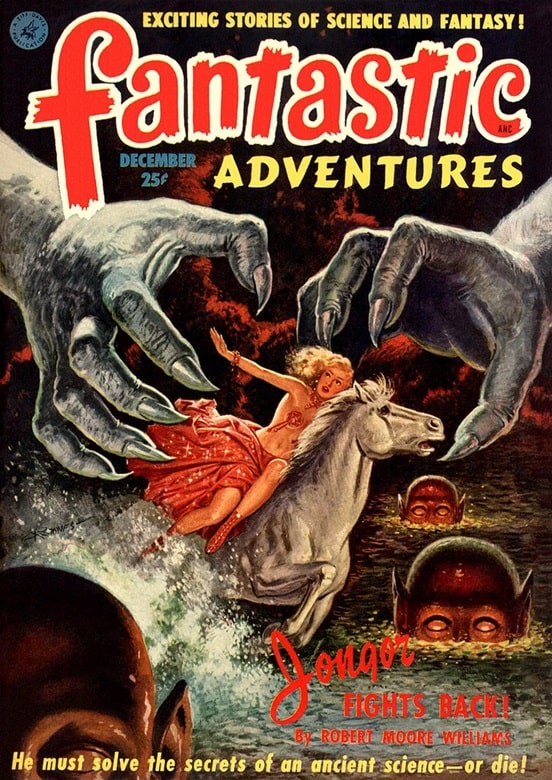 Fantastic Adventures, December 1951, containing the first publication of Jongor Fights Back. Cover by Robert Gibson Jones
Fantastic Adventures, December 1951, containing the first publication of Jongor Fights Back. Cover by Robert Gibson Jones
I found out this was the third book in the series, which included Jongar of the Lost World and The Return of Jongar. I decided not to spend any money getting them.
But then I saw Moore had written a Sword & Planet series. I had to have it and bought all four, shown below. All were from Lancer and as Lancers tend to do, they are falling apart.
The series in order is:
Zanthar of the Many Worlds 1967, Jeff Jones cover
Zanthar at Moon’s Madness, 1968, excellent Jeff Jones cover
Zanthar at the Edge of Never, 1968, Emshwiller cover
Zathar at Trip’s End, 1969, excellent Jeff Jones cover
I read the first one and put the other three away. Those of you who have been following this series know I love Sword & Planet fiction. It’s why I read a lot of it and why I write it. It can be the purest form of adventure fiction, and I take it seriously.
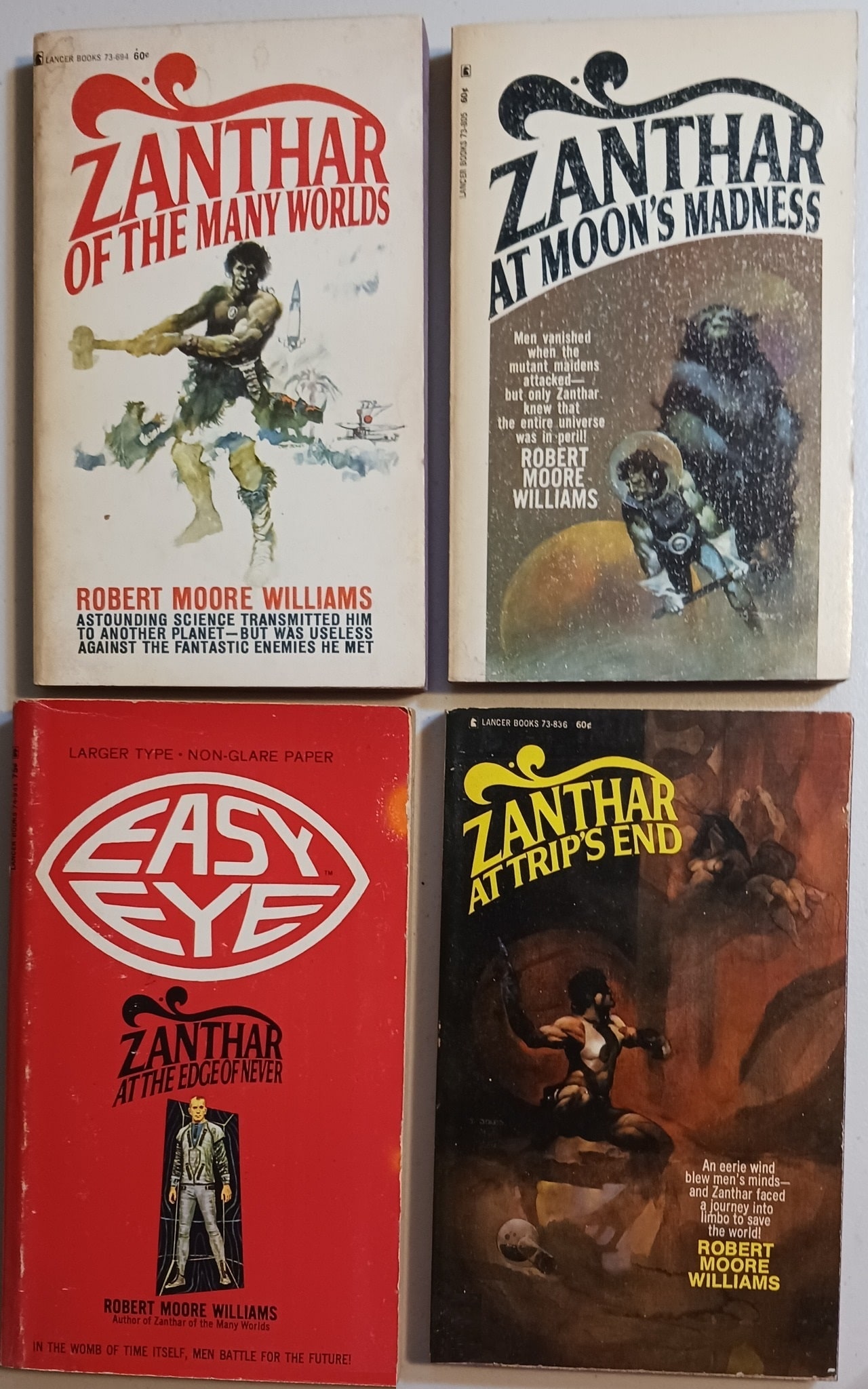 The Zanthar series (Lancer Books, 1967-1969). Covers by Jeff Jones and Ed Emshwiller
The Zanthar series (Lancer Books, 1967-1969). Covers by Jeff Jones and Ed Emshwiller
I also demand that the S&P writers I read take it seriously too. I’m afraid I can’t quite picture Robert Moore Williams taking the genre seriously.
I only read the first book, because it was just terrible. The book begins with John Zanthar, a brilliant Earth scientist who invents a machine that opens portals to other worlds.
Zanthar is sucked through it accidentally, and later two of his students are as well. So is a man named Fu Cong, who becomes the primary villain. So far, so OK.
Then the weaknesses arise. Most good S&P writers show that transportation to an alien world causes the hero some dislocation and discomfort. Not Zanthar. In the first few pages he acquires allies who decide he’s a god, and defeats the leader of a horde of attackers riding “miniature dinosaurs.” These appear to be T Rexes a bit bigger than the “Velociraptors” of Jurassic Park.
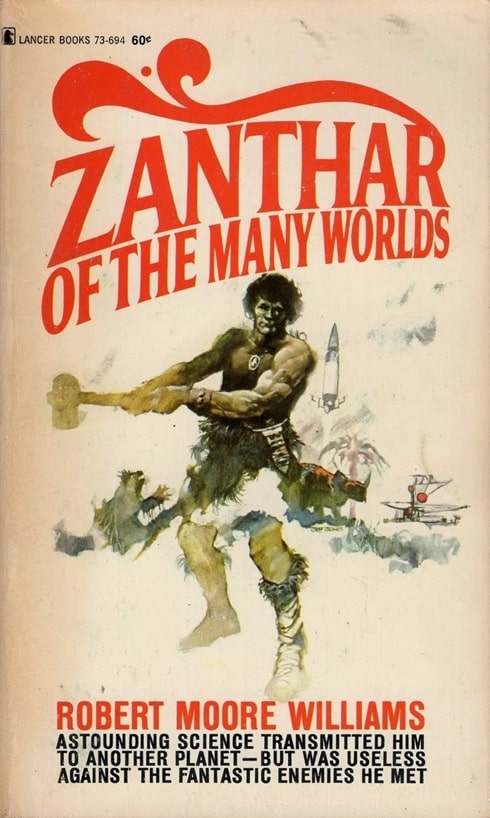
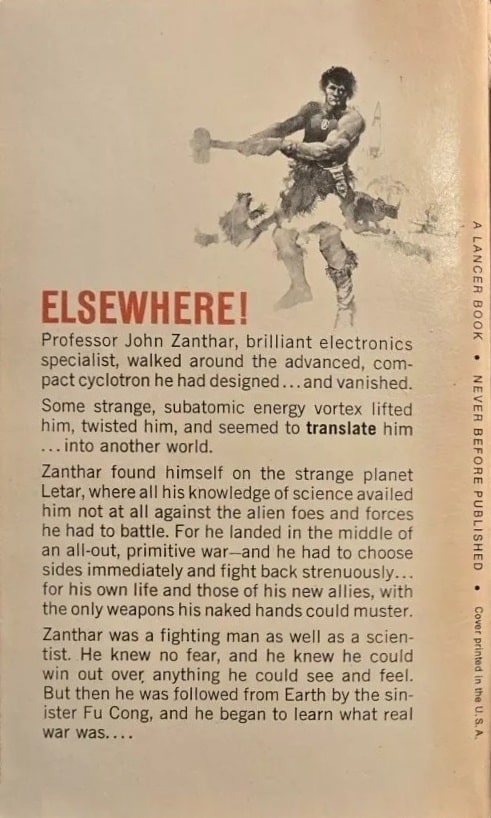
Zanthar of the Many Worlds (Lancer Books, 1967). Cover by Jeff Jones
Zanthar kills one dinosaur with a single blow from a “copper hammer” he’d been carrying in his lab when the transportation occurred. He also has no problem communicating with his new friends, who are conveniently riding telepathic beasts. And one of his new allies is a beautiful woman capable of healing any wound by laying hands on it and concentrating. Later she proves capable of raising the dead. (I’m not sure I’ve ever had a day that easy in the real world.)
I’m also a lover of good poetical prose, and the best S&P fiction has this. The prose in Zanthar of the Many Worlds is completely leaden, and in many cases just downright silly. Here’s a bit from early in the book:
And then: ‘The love-life?’ Zanthar questioned. He did not understand the term. In fact, he was not at all certain that he understood a tenth of the words she used. ‘I do not understand.’
The repetition was just wretched.
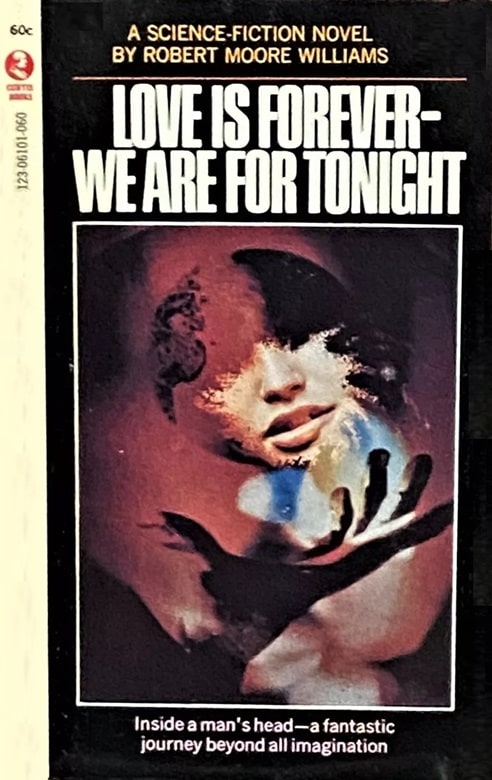
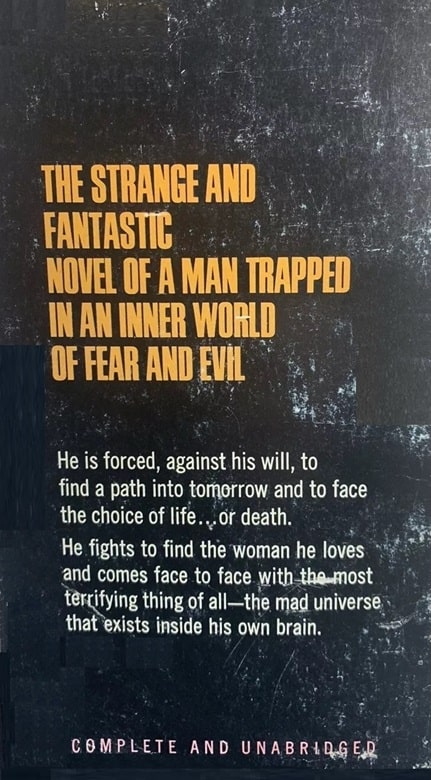
Love is Forever – We Are for Tonight (Curtis Books, 1970). Cover uncredited
Later, there’s an actual bit of dialogue imagined by Zanthar between atoms. I’m not making this up. Here it is:
Zanthar had the impression that he could hear the atoms talking each to the other, saying, ‘Brother, where are you?’
‘Comrade, what has happened?’
‘Sister, why are we in darkness?’
‘Cousin molecule, where has mother gone?’
‘And where is father?’
‘Is — is this the night that never ends?’ an atomic voice wailed.
‘Is — is this the end of the universe of atoms?’ another whispered.”
That was it for me. I scanned the rest of the book but can’t in good conscience recommend it to anyone.
I haven’t even tried the sequels. I can’t imagine they are better. I imagine these were published to take advantage of the paperback boom in the 1960s. The publication dates suggest they weren’t written exceedingly fast but Williams might have been writing a lot of other stuff at the time. They show very little evidence of careful construction. I read a quote once from Truman Capote about Jack Kerouac that I think applies to Robert Moore Williams: “That’s not writing, that’s typing.”
Charles Gramlich administers The Swords & Planet League group on Facebook, where this post first appeared. His last article for Black Gate was Chess in Sword & Planet Fiction, Part IV: Lin Carter’s Callisto.
7 Author Shoutouts | Authors We Love To Recommend
Here are 7 Author Shoutouts for this week. Find your favorite author or discover an…
The post 7 Author Shoutouts | Authors We Love To Recommend appeared first on LitStack.
2024 Team Favorites - Łukasz
It’s time to start wrapping up the year, and since I can’t resist a good Top X list, here’s mine! Books, comics, TV series-you name it, I’ve got some gems to share.
This year, I read a ton and stumbled upon some absolute winners that I’m excited to shout about.
I hope some of these picks grab your attention, especially since I’m convinced a few of them are tragically underread and deserve way more love.
BOOKS

NAVOLA by Paolo Bacigalupi - Political intrigue? Check. Deeply personal stakes? Double check. Scheming Machiavellian side characters? Oh, yes. Navola delivers all this and more! Bacigalupi shifts from heartfelt moments to bursts of calculated violence and an overwhelming sense of bleakness with ease and perfect timing, and I savored every second. While some call it a standalone with an open ending, I’m choosing to believe it’s just the start of an epic series. Fingers crossed!
Edit: I read an interview with Bacigalupi (Locus Mag, Dec 2024) and it seems it's a series.

LEVIATHAN by Robert McCammon - Matthew Corbett series ends with Leviathan. It's also my favorite series of the decade. The ending is fitting, thrilling, and satisfying. Read it if you like historical thrillers, high personal stakes, and, just perhaps, a supernatural evil lurking in the shadows.

THE TAINTED CUP by Robert Jackson Bennett - Bennett is a genre-blending wizard, and The Tainted Cup is no exception. Fantasy, murder mystery, coming-of-age, and a sprinkle of body horror (trees literally growing out of people)—what’s not to love? And shoutout to Anna Dolabra, the eccentric genius who prefers to stay blindfolded at all times (for reasons) and won’t leave her room unless absolutely necessary. She stole every scene.
.jpg)
THE STORM BENEATH THE WORLD by Michael R. Fletcher - Dark fantasy fans, rejoice! Fletcher strikes again with this wildly imaginative and deeply entertaining tale. Featuring insectile ashkaro getting high on their lethal powers, it’s not as grimdark as the cover might suggest—there are surprisingly heartfelt moments. But don’t worry, it’s still bloody, brutal, and unapologetically Fletch. A must-read for fans of the genre.
.jpg)
THE ADVENTURES OF AMINA AL-SIRAFI by Shannon Chakraborty - Amina al-Sirafi is a 40-something mom with a bad knee and a past as a legendary pirate queen. Balancing parenting with piracy? Not easy, which is why she’s tried to retire into a quiet life. Naturally, chaos ensues, and Amina is dragged back into action. This book is colorful, adventurous, and so much fun—plus, the audiobook is a treat!

DIAVOLA by Jennifer Marie Thorne A haunted house story with a twist. Diavola takes the genre’s best elements and gives them a snarky, personality-packed makeover. Anna, the narrator, is sharp-tongued and divisive—if her tone clicks with you, buckle up for a ride that’s equal parts tense and hilarious.

A SICK GRAY LAUGH by Nicole Cushing Dense, philosophical, and unapologetically weird, this book dives deep into the troubled mind of its protagonist while layering in existentially dark humor. It’s challenging but rewarding, with moments of pure brilliance. If you’re into meta storytelling and books that make you think (and squirm), give it a go.

FEVER HOUSE by Keith Rosson Pure kinetic horror with cinematic pacing, top-tier writing, and characters you’ll root for (or against). It’s brutal, wild, and an absolute blast. Easily one of my favorite reads this year!

THE PRESTIGE by Christopher Priest The Prestige is excellent. It tells an unputdownable story of obsession, deception, and blurred boundaries between reality and illusion.

THE BOOK THAT BROKE THE WORLD by Mark Lawrence - It’s darker than the first book in the series, shockingly so in places. Livira and Malar aren’t happy with their new circumstances. Rather unpleasant insectoids and a mechanical monster try to kill Evar and his siblings. New POV characters can’t can't complain about boredom either.COMIC BOOKS / GRAPHIC NOVELS

LUCIFER by Mike Carey Dark, brilliant, and beautifully written, with stunning art to match. Carey’s Lucifer is a masterpiece of character-driven storytelling.

THE WALKING DEAD by Robert Kirkman Nobody—and I mean nobody—is safe in The Walking Dead. I devoured 15 years of Kirkman’s work in under two weeks and loved every second. Emotional trauma, zombies, and morally gray leaders? Sign me up.

MEDEA by Blandine Le Callet
Medea: villain, victim, or misunderstood antihero? In this stunning graphic novel, Blandine Le Callet and Nancy Peña give Medea the floor to tell her story, and it’s riveting.
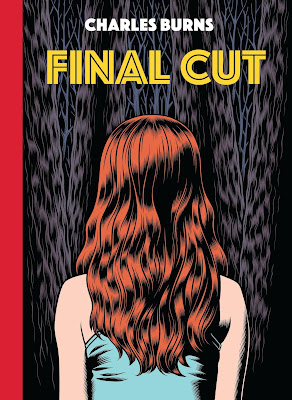
FINAL CUT by Charles Burns - Final Cut is a beautifully weird, unsettling, and surprisingly tender look at love, art, and the stories we tell ourselves. If you’re a fan of Charles Burns or just love weird, thoughtful comics, this one’s worth the ride.

THE NICE HOUSE ON THE LAKE by James Tynion IV
A mind-bending concept, great writing, and atmospheric art make this series a standout. Sure, the characters could’ve been fleshed out more, but I had a blast and am eagerly awaiting the teased second cycle.TV SERIES
 MR. ROBOT
MR. ROBOTWhat more can I say? It’s a masterpiece. Exceptional acting, clever writing, twists on twists on twists—if you haven’t seen it yet, fix that.FALLOUT
It’s all fun and games on the surface, but dig deeper, and it’s genuinely chilling. That said, I had an absolute blast with this series. Ella Purnell and Walton Goggins are fantastic!SHOGUN
Visually stunning and deeply immersive. I haven’t read the book it’s based on (yet), but the series is excellent on its own.BLUE EYE SAMURAI
Magnificent. I binged this in two days, and it was worth every second.ARCANE
I know, I know—I’m late to the party. But hey, better late than never, right? And wow, was it worth the hype. Spectacular storytelling and visuals!
There you have it! What are your favorites from the year?
Lividian Publications: One last set of bluelines for 2024
Brian Freeman of Lividian Publications posted this on his Patreon today:
We’re looking over the bluelines (proofs) for one of our big 2025 projects tonight. Hope everyone is doing something they like to end the year. What do you have planned?



Look for an official pre-order announcement sometime in early 2025!
The Failed Giant: Five Tributes to Barry N. Malzberg
 Barry N. Malzberg
Barry N. Malzberg
Barry N. Malzberg died on December 19. In his Black Gate obituary, Rich Horton wrote:
Malzberg was in his unique way a true giant in our field. Barry himself, in his later years, seemed to regard his career as a failure, but it was no such thing. He may have stopped publishing novels out of a feeling the publishing world wasn’t receptive to his work, but the best of what he did publish is outstanding, and thoroughly representative of his own vision.
Tributes and reminiscences have poured in over the last week, and many amplify Rich’s comments, especially in regard to both the importance of Malzberg’s work, and his embittered attitude towards the field near the end of his career. Several writers, including Adam-Troy Castro and Gregory Feeley, have generously granted permission for me to reprint their lengthy comments here, including several fascinating anecdotes.
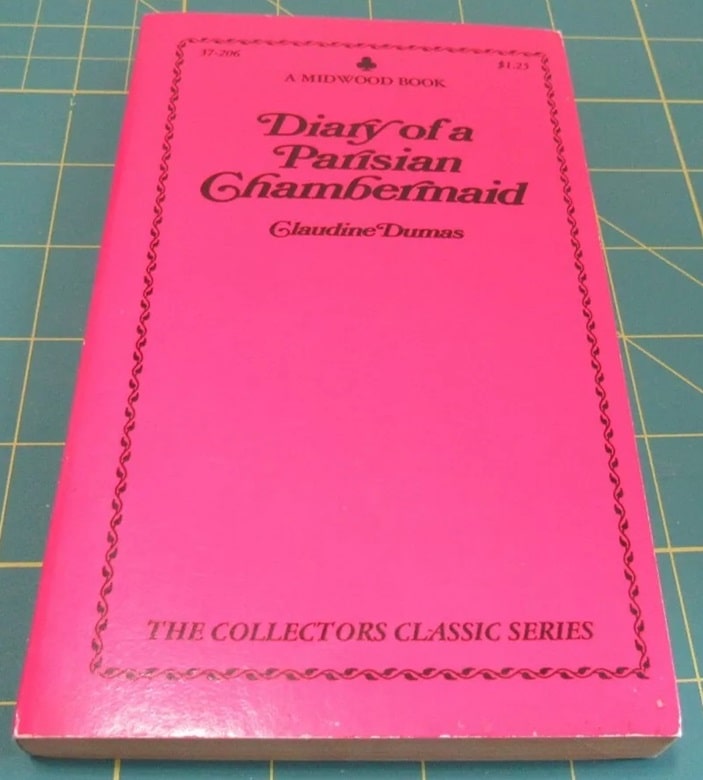 Diary of a Parisian Chambermaid by Claudine Dumas (Barry N. Malzberg). Midwood, 1969.
Diary of a Parisian Chambermaid by Claudine Dumas (Barry N. Malzberg). Midwood, 1969.
The quotes below have been edited for length.
Jeet Heer produced an insightful and entertaining retrospective of Malzberg’s lengthy career for The Nation, titled “Novelist on a Deadline: Barry Malzberg, 1939–2024.” Here’s an excerpt.
If your life absolutely depended on it, could you write a readable and publishable novel in 27 hours? In early February of 1969, that was the task an editor at Midwood books foisted on Barry Malzberg, then a 29-year-old rising star in the seedy world of the paperback quickie… On February 13, Malzberg sat down at the typewriter at 8 am and started banging away at his top rate of 60 words a minute… He finished the book the next day…
Malzberg, who died in a hospice in New Jersey on Thursday at the age of 85, flourished in the world of pulp fiction where quick writing was common: Malzberg’s friends Isaac Asimov and Robert Silverberg would both compile bibliographies of more than 500 titles. But even in that hurly-burly realm, Malzberg was a marvel. Reflecting on Diary of a Parisian Chambermaid in 2017, Malzberg told a podcast that, “in my opinion, with all deference to some writers we can name, it is the best novel written in 16 hours ever.”
In his peak decade, from 1967 to 1976, Malzberg wrote at least 68 novels and seven story collections along with scores of still uncollected stories published in many magazines and anthologies. He worked in a variety of genres, including mystery, thrillers, erotica, and adventure fiction, but his core work was in science fiction… Along with his peers J.G. Ballard, Samuel Delany and Philip K. Dick, Malzberg was a central figure in the movement of science fiction away from the external world of adventure fiction and outer space into the psychological torments and struggles of inner space…
But the struggle to write plays and stories for small literary magazines proved unappealing… In a 1979 interview, Malzberg recalled that in 1965, “I was being rejected. I was writing literary short stories and drowning in rejections and I just did not want to go any further. In October or November of that year I read in Galaxy magazine Norman Kagan’s story ‘Laugh Along with Franz.’ It was a brilliant, savage piece of science fiction, except it wasn’t science fiction at all, it was a serious, savage work of American fiction by a young American fiction writer. I shook my head as I read it and I cynically said to myself, if this son of a bitch can get away with this kind of stuff in the commercial science-fiction genre then I’ve got a future.”
By 1977, with the smash success of Star Wars, Malzberg’s somber and brooding fiction lost whatever cachet it once had. The dominant note of the genre returned to escapist adventure yarns. Malzberg, increasingly at odds with science fiction fans, wrote his last novel in 1983, although he continued to be a fecund writer of short stories.
The whole thing is worth reading. Check it out here.
John Clute shared a heartfelt reminiscence on Facebook on December 20.
Knew his work from the get-go. Finally met in the late 1980s. We were both (I guess) a bit clattery, but almost immediately found an affinity under the noise of being human, which never faded. Miss him hugely.
We both shared a sense of aftermath about science fiction; for me, from the outside, the end of sf started with the Five Point Palm Exploding Heart of Sputnik; for him it was more profound, intimate, painful. He was at the same time one of the funniest people I have ever met. Deadpan, irresistible. Passionate about the loss of the world. So I feel passionate now.
Robert J. Sawyer posted a brief tribute on Dec. 19.
The great Barry N. Malzberg has left us at the age of 85. Barry and I became friends during the many years we were both judges for the Cordwainer Smith Rediscovery Award, and when Barry retired from being the opinion columnist for Galaxy’s Edge magazine, I took his place.
Barry’s fiction was caustic and iconoclastic. His nonfiction about our genre was trenchant and heartbreaking; he knew what our field was capable of, and he decried the forces of publishing that so often kept if from fulfilling its potential.
Rest in peace, my friend.
I first heard about Malzberg’s death from Gregory Feeley, who shared the news on Facebook.
Thinking about Barry Malzberg, who died today. I was reading him in high school in 1970, when he appeared regularly in F&SF and Amazing. We corresponded for years, and talked at conventions.
I don’t think he ever read any of my fiction; by the 1980s he was largely disillusioned with science fiction, and focused his energies on the SF of his own youth. He did compliment me on my essays several times.
Barry was saturnine and frequently made predictions of an imminent disaster in the field, or perhaps in all of publishing. He was a cynic whose heart was always being broken, which I guess kind of makes him a failed cynic.
He could be awfully funny. I will miss him.
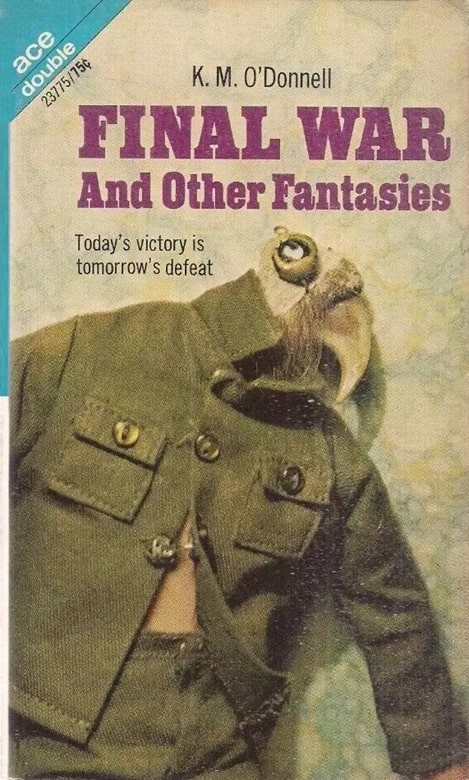 Final War and Other Fantasies, by “K. M. O’Donnell” (Barry Malzberg), Ace Double paired with John Rackham’s Treasure of Tau Ceti (Ace Books, October 1969). Cover by Panos Koutrouboussis
Final War and Other Fantasies, by “K. M. O’Donnell” (Barry Malzberg), Ace Double paired with John Rackham’s Treasure of Tau Ceti (Ace Books, October 1969). Cover by Panos Koutrouboussis
Greg expanded on his thoughts in a revealing Dec 20 piece titled A BIT MORE ABOUT BARRY MALZBERG.
Barry Malzberg was born in 1938 and grew up reading 1950s science fiction. His favorite magazine was Galaxy, which (if you knew Barry and his taste) was totally unsurprising.
He ended up writing science fiction, but I don’t think he particularly meant to. He wrote the novelette “Final War” in the mid-sixties, and described how he could not sell it to any of the slick magazines — Playboy, Esquire, The Atlantic. Finally he sold it, under a pseudonym, “K.M. O’Donnell,” to F&SF.
Meanwhile he published some short fiction, first a story in Escapade (a third-tier men’s magazine) in early 1967, and then a short-short to Fred Pohl in Galaxy later that year. The Escapade story was published under his own name, but the Galaxy story was by K.M. O’Donnell. Barry immediately sent Pohl a sequel, which Pohl bounced, noting that sequels were usually bad ideas (which Barry admitted he knew). He went on to write a number of SF stories in 1967-68, and some appeared in F&SF and Galaxy. All were as by K.M. O’Donnell
“Final War” was a Nebula finalist in the spring of 1969, and on the strength of that, Barry put together the stories he had written, including those he had not found a publisher for, and sold them to Donald Wollheim as a 129-page Ace Double, Final War and Other Fantasies. He published a second Ace Double, Dwellers [of] the Deep (113 pages), the next year.
It was in 1970 that Barry began to publish SF under his own name. (I read the first two stories, in the Harry Harrison anthology NOVA 1 and in the April F&SF, when they came out.) A few stories as “by K.M. O’Donnell” came out over the next couple years. Perhaps they had already gone out, or been sold, under that byline.
In 1971 Barry published first SF novels under his own name. He published almost entirely under his own name from that point on.
One conclusion to draw from this is that Barry wanted, very badly, to be a mainstream literary writer, and when he was driven to send the stories he could not sell in the mainstream to SF magazines, and to write some expressly for the SF market, he used a pseudonym.
When he realized that he could not sell mainstream stories (or — after a few more Olympia titles — novels) and that he could sell SF, he decided that he was going to write SF, and a lot of it. But I believe that all his SF (except for “Final War” and maybe one or two other early ones) was written in the awareness of being a failed mainstream writer and that this deeply colored the stories he wrote: their mordancy, their obsession with failure, and — this was very clear in the non-fiction pieces he wrote, most of which were of a personal nature — an unmistakable degree of self-contempt.
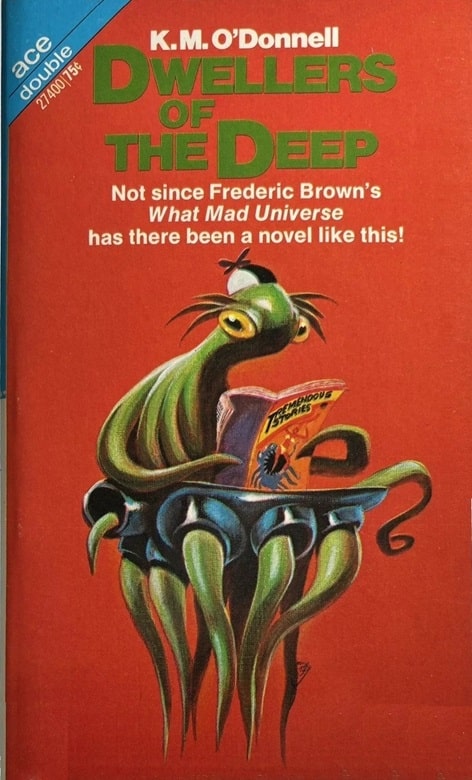 Dwellers of the Deep (Ace Books, December 1970). Cover by Jack Gaughan
Dwellers of the Deep (Ace Books, December 1970). Cover by Jack Gaughan
Gregory Feeley wrapped up his reminiscence with ONE MORE POST ON BARRY MALZBERG, also on December 20.
In the fall of 1973 Barry wrote a short piece, evidently for a fanzine that had asked for one, about the SF novel he had written in four days. The piece was apparently not published until his 1980 nonfiction collection came out, where he titled it “September 1973: What I Did Last Summer.”
He describes how he spent the summer writing three pseudonymous novels in the Lone Wolf series for Berkley, a movie novelization, and “Tactics of Mistake,” which he produced after Roger Elwood got a contract to edit twelve SF titles for Pyramid. Elwood offered Barry $4000 for one. Elwood didn’t require even an outline, but he needed the novel quickly.
Barry accepted but insisted—it was apparently part of his paperback writer’s code — on not writing a word until he had the on-signing money in hand. By the time he got it, he didn’t have much time (although it was more than a week). Nonetheless, he took a 2600-word story he had written for F&SF and in four days turned it into the 55,000 word novel. Describing the process, he wrote: “My oh my did I pad and overload! Sentences became pages, paragraphs became chapters.” He added flashbacks and what he called “tasteful” sex scenes, explaining that sex in science fiction needed to be tasteful. (This is at once ironic — he knew that it was no longer true — and a kind of self-scorn.)
In the end, Elwood accepts the novel (Tactics of Conquest appeared in early 1974) and asks for another. Accepting, Barry decides that “I think I will expand my story ‘A Galaxy Called Rome,’ which I also wrote last summer. I can fill in on that one, too, and this story is nine thousand words, not twenty-six hundred, which makes it easier to bloat.”
He concludes by writing, “I am going to end this composition because I am very tired and you only asked for fourteen hundred words on what I did last summer and here they are and I hope my fourteen-dollar check will be payable on receipt because I really need the money. I really do. I always will. I’ll make sure of it.”
So what do we make of this? The self-loathing is so pronounced as to be a kind of performance, in which he wants to be both taken seriously and not actually taken seriously. He is certainly right that the novels were bloated. (The second one was called Galaxies, which Pyramid published in 1975, ran only 128 pages, but its proper length had indeed been those original nine thousand words.) On some level he knows that he was debauching his talent, giving readers too-short but overlong novels, and was taking advantage of editors who had trusted him to do something good. On another level, he is clearly proud of himself.
One explanation can be seen in the fact that most of the books Barry published during this period were dedicated to his wife and daughters. He was providing for them. He wasn’t going to starve in a garret writing brilliant short stories and infrequent brilliant novels like Theodore Sturgeon. He was doing to support his family.
On another level, he was clearly saying, “So, literary world, you don’t want me? You think I should be a crappy science fiction writer. All right — I will give that to you in spades.”
Barry published five SF novels in 1974 plus a collection (in addition to an unknown number of pseudonymous series books) and four in 1975 plus another collection. After that the number of book editors willing to publish him dropped off, and he began to write thrillers in collaboration with Bill Pronzini. Toward the end of the decade Doubleday published a novel and two (!) collections, but they did not go to paperback, so that was that.
Had had he spent more time on his novels and published fewer of them, would Random House and the others continued to publish him? I doubt it. Barry’s novels were strikingly similar in tone, most of them had very skimpy story lines (themes but no real plots), and he wrote repeatedly about the same things: political assassinations, astronauts going insane, and horse racing. Sometimes it was hack writers or chess players who were going insane, but the narrative tactics were almost identical.
Michael Moorcock once noted that M. John Harrison had a “somewhat narrow range,” on which he composed carefully written variations. Barry had a narrow range, but he was unwilling to make a meager living composing carefully wrought novels and stories. The two writers were similar in one respect and diametrically opposite in another.
Barry also had real problems with plotting. Nothing actually happens in most of these novels. (He was also very weak with portraying women.) He had his voice, sardonic, bleak, and often very funny, though it never really varied from one book to another. That was what his fiction offered.
Beyond Apollo was better than the story “Notes for a Novel About the First Ship Ever to Venus” and it won a prize, which allowed him to sell and write a lot of books quickly. But constructing flimsy story lines about the same miserable, obsessive characters in static situations didn’t work.
Naturally, this did nothing to allay Barry’s misery.
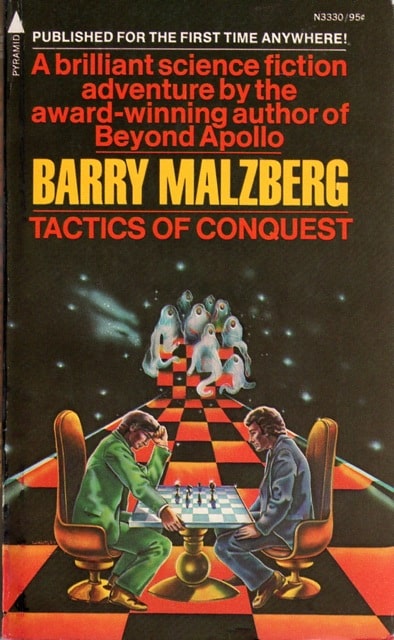
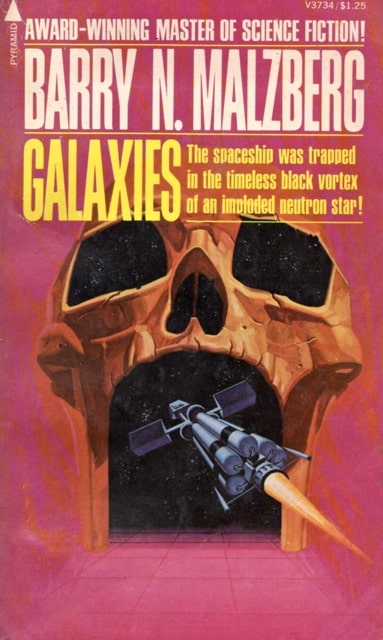
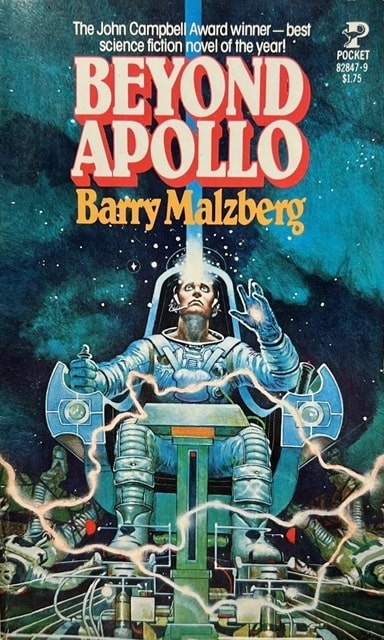
Tactics of Conquest (Pyramid Books, February 1974), Galaxies (Pyramid Books, August 1975),
and Beyond Apollo (Pocket Books, June 1979). Covers by Ron Walotsky, unknown, Don Maitz
I’d like to close this article with a pair of affectionate remembrances by Malzberg’s friend Adam-Troy Castro, the first shared on Facebook on the day he died.
Barry Malzberg has passed.
This is not a huge surprise. He was 85.
Nor is it a huge shock to the current system. Many, many years ago, I think before I had published anything, he was one of three powerful, dynamiting writers to declare publicly, and together, that they were done with science fiction. It was an attack on the infrastructure, not the potential of the field, and all three (Silverberg, Ellison and Malzberg) went back, though I think it was Barry whose public stance hurt him most — if not because he was less commercial, then certainly because he had leapt from a shorter precipice.
I think that from that point on, his output was one thin novel and a short story whenever it occurred to him, which was occasionally. Oh, and also a column for SFWA, which I will get to, cursing the necessity.
Barry was deeply aware that the publishing business included some scams that were aimed at writers of little promise, and for some time he worked, miserably, at the office of a major agent where it was his job to write encouraging letters which would encourage the wholly unpromising to send more, with additional agenting fees. This was shit work for him, and it did not thrill him.
Barry wrote dozens of novels, over a hundred I believe, some of which were absolutely terrific, but I think he won his place in posterity with two of them, in particular: Galaxies, which was self-described as not an sf novel but a series of authorial notes about a novel that could not be written; and Herovit’s World, about an sf writer who mass-produced novels about a Kirk-like character, but whose life never improved, until his sanity fractured and he became several personalities, including that of his protagonist. I think the novel a tour-de-force not specifically about science fiction, but about the writing profession, and it is nightmarish, and nightmarishly funny…
Where I am still irritated with the readership, and with much of the writership in general, was with the reaction a lot of people had to a column he wrote in collaboration with Mike Resnick, about (what we currently see as) old time editors, where the two long-in-the-tooth men talked about among other things the women in the field they had found attractive. This column erupted into a firestorm, something I fully understand, and still refer to as the time the two venerable and deeply respected figures stepped on their own dicks. I think they took as much anger as they deserved, as well as having the column taken away from them — but critically, also think they took more, in all the ways that we are now deeply familiar with, the self-righteous statements from unforgiving representatives of rage who wanted us to know that they had never even heard of Malzberg and Resnick, never had read anything they’d written, and “never would;” who then turned their rage on anyone, including myself, who agreed that the two old guys had overstepped but also held for the value of their respective bodies of work. How dare we?
I half-suspect that I might be the subject of rage just for saying this, but drawing a red marker over hundreds of works because you’re mad with the author, with full confidence that you’re missing nothing, is the act of a short-sighted idiot. (Now some of you will devote manifestos to why you’re entitled to, and please, the guy is being mourned here; don’t be an ass.)
And look, I know why people were mad at Malzberg. I even agree with them. I am, despite the assertions that will definitely accrue, fully able to admit that the two guys were acting in blind opposition to a world that had changed while they were not looking, and that the offense taken was entirely justified. But BEYOND THAT, he was in his time, one of the very best writers in the field, a prosesmith of incredible gifts, a guy who for years raged against the limitations of the literature and against the mostly-blinkered expectations of the fans, who he saw as enemies of the field’s possibilities. This was a brave position for him to take, and it cost him: I recall having a delightful lunch with him, just him and me and the actor Caryl Struycken (“Lurch”), who said nothing, at an I-Con where he was guest of honor, where he had to go to deliver his speech and later, heart-broken, reported that not a single person had showed up. I damned myself for not going. But goddamn it, he was the guy who wrote Beyond Apollo, The Time of the Burning, and the aforementioned Herovit’s World and Galaxies, and these were his monument, and what he deserved as legacy was not to have those few offensive paragraphs in the SFWA Bulletin forever pointed to as the reason he needed to be expunged and forgotten forever, but for a statute of limitations to pass so that his importance as a writer, and not as a sometimes blinkered gadfly, could pass back into relevancy…
He was a great writer, sometimes a very funny one, sometimes a heart-breaking one. He wrote at least one great novelette about the Kennedy assassination, that I cannot name now; but it is important to note that at least five of his shorter works are dancing in my brain now. He was important, I think. I deeply recommend that everybody who reads this obtain for themselves the collection, The Passage of the Light: The Recursive Science Fiction of Barry N. Malzberg, which contains a couple of novels and a scattering of short stories. “Herovit’s World” is among the contents. $14.00, still in print, worth getting…
Barry Malzberg, I salute thee. I am proud to have known you.
In a comment on a December 20 post, Adam-Troy shared a fascinating anecdote from one of Malzberg’s many convention appearances.
Barry really did think that the market for science fiction made it impossible to use it to tell adult stories. I remember thinking, “Well, if you want to be Joseph Heller, go ahead; you are that good.” And some of his novels were that good, including the two I keep singling out for special praise, Galaxies and Herovit’s World, both of which got lost in bookshelves with paperbacks that had rocket ships on the covers.
Nevertheless, when at science fiction conventions he quietly seethed that more of a fuss wasn’t made, and I clearly remember a ceremony where he came up to the big name who was sitting next to me and muttered, “I have to go, I can’t take any more of this.” Then he stormed off, and the big name, who I can no longer identify, said, “Barry doesn’t like getting a sub-ordinary audience for extraordinary stories.” And by then, based only on the evidence I had encountered in print, I would have done anything for him.
But also, I have to say, he was a great early model on the uselessness of wearing one’s professional heartbreak on one’s sleeve.
For a comprehensive summary of Malzberg’s accomplishments over a lengthy career, see his detailed obituary at Locus Online.
Review: The Relentless Legion by J.S. Dewes

She is the author of the Divide series (The Last Watch, The Exiled Fleet) and Rubicon
Jenny spends her free time drawing, gaming, scrolling ArtStation, cuddling her two sweet dogs and mercurial cat, and occasionally sleeping.
FORMAT/INFO: The Relentless Legion was published on November 12th, 2024, by Tor Books. It is 512 pages long. It is available in paperback, ebook, and audiobook formats.
OVERVIEW/ANALYSIS: After a harrowing journey to recover the fuel and supplies needed to bring the fleet safely home from the Divide, the Sentinels have at last returned to the center of civilized space. They've spent months in hiding, preparing to go to war with Cavalon's grandfather, Augustus Mercer. Obsessed with eradicating a specific incurable genetic defect from humanity, Augustus has been playing a long game, using legislation to slowly ostracize any affected humans from society. But the long game is coming to an end, as Augustus is preparing to unleash a horrific weapon on the galaxy. It will take every ally that Rake and Cavalon can rally if they're going to have a prayer of stopping the plot in time.
The Relentless Legion is another fantastic adventure in The Divide series that continues to raise the stakes for the fate of the universe. This one is a little slower-paced than the previous novels in the series, preferring to take some time to focus on how the characters are coping with the strain of the last several months (spoiler, some of them are not). I will say that I did find Cavalon a bit exasperating this novel, but the author seems fully aware of it, given that characters called him out for exactly the things that were frustrating me. The characters get a chance to regroup and reflect before everything goes sideways.
And it WILL go sideways. If you've enjoyed the author's action-packed books in the past, there is plenty of conflict to be found here. The midpoint was particularly nail-biting, an absolute gut-punch in more ways than one. You can also expect some surprising developments as Rake and Cavalon continue to deepen their understanding of the Divide and the devices that keep the collapse of the universe at bay.
The one negative I had with this book is it felt like there were too many things going on. The Divide books have always juggled multiple threats, from the collapsing edge of the universe, the reappearance of alien enemies, and the conspiracy led by Augustus Mercer. Past books have managed to keep everything balanced and give every storyline its due. This third book, however, introduced a new problem originating from the alien ruins our group has chosen as their hideout, and that new problem proved to be just one too many things for me.
CONCLUSION: The Relentless Legion is a fitting conclusion to a sci-fi adventure I've really enjoyed. But it isn't a complete conclusion. While one of the major storylines is wrapped up by the end of the book, the door is left wide open on another one, with plenty of runway for more adventures. No fourth book has been announced as of writing this review, but I would not be shocked (and very pleased) to hear of one eventually, especially as official marketing for The Relentless Legion refers to The Divide as a series, not a trilogy. With that in mind, be prepared to have some loose threads dangling when the dust settles. I, for one, will be happy to come back if another book is in our future, but if not, The Relentless Legion is a satisfying send off for a new favorite series.
The Last Monday of the Year
I hope your holidays were quiet and peaceful. Our Christmas was low stress and chill, with lots of gifts and warm and cozy family time. I got a new toolkit, markers, and yarn. Beautiful yarn! Hehehehe.
It’s Monday. All of the previous giveaway winners have been taken care of. Their prizes have been sent or put into production and they should be receiving them shortly.
I’ve had a very frustrating morning. Our health insurer pulled out of the state exchange and so we are back to BCBS HMO, and that means trying to get a primary doctor for all referrals. I cannot even explain what a PIA that has been so far. Grrr. I finally gave up and called Jeaniene to vent.
Oh, by the way, this was not from my cousin-in-law but from Jeaniene.

I should’ve known!
Also the following dialogue had taken place just before Christmas.
Gordon: Strange package from Amazon. No specific sender.
Me: What’s in it?

Gordon: Wagyu beef lard, black garlic, and a stuffed toy French fires. Who would send us expensive lard?
Me: I have no idea. Was this misaddressed?
Gordon: I have to tell you, the idea that unknown and possibly random people are sending us packages is vaguely upsetting.
The next day…
Grace Draven, texting: Did you get an Amazon delivery yesterday?
Me: It was you!
Grace: I thought you would figure it out because of the fries.
I am in possession of gourmet lard and black garlic. I must do something with it. But the French Fries are probably the best. I’ve hugged them already. They helped.
The Last 2024 GiveawayI promised you one more. This one will be a very simple one and will have no monetary value assigned to it. Not very exciting. There will be just one prize.
Prize:
- The winner will receive one spot on ARC list for all Ilona Andrews fiction for the year 2025. Meaning, you will get to read Maggie early and whatever else is coming down the pipeline.
Limitations:
- For the legal purposes, we might have to ask you to sign a document stating that you will not upload or share confidential files. It will not be a full NDA, as in we will not prevent you from discussing the book, but we might request that you stick to a certain time frame. We will have to coordinate with our publisher. This is not a reflection on BDH trustworthiness, but more of a standard operating procedure because there is a publishing partner involved.
Who Can Enter:
- Anyone.
How to Enter:
Leave a comment on this blog post telling us which is your favorite Ilona Andrews book and why. If you are a new reader and haven’t tried us before, leave us a comment wishing us happy holidays. You must comment here, on the blog. Not on Facebook or on Insta, on this blog post. Here is a link if you are reading the article in your email newsletter.
Deadline:
You must enter by the end of Thursday, January 2nd. Winners will be announced on Friday.
The post The Last Monday of the Year first appeared on ILONA ANDREWS.
Free Fiction Monday: Theatrical Review
Portia, a magical theatrical dramaturg, answers a friend’s call to help a group of frightened high school theater students connect with their new theater. Fording through snow and the holidays, Portia must discover the cause of their fear—and then fix it, magically. No easy task.
When theater, ghosts and students collide, Portia must balance all three to keep everyone’s spirits alive.
“Theatrical Revival” is available for one week on this site. The ebook is also available on all retail stores, as well as here.
And if you want more holiday stories, fill your holiday reading stocking to last the whole year here on the Holiday Spectacular store.
Theatrical Revival A Wyrd Sisters Story By Kristine Kathryn Rusch
ONE
We don’t celebrate Christmas in our family. My mother and her sisters took the entire Christmas season as an affront. The family usually gathered anyway—sometimes for a Yule celebration, but more often for some Solstice rituals—and we girls had to suffer through the complaints of our mother and her sisters.
They considered Christmas stolen, so that the Roman Catholic Church could convert the pagans from their own religion into something male and patriarchal and horrible.
I’m not going to recap the arguments here. I can still hear them ringing in my ears. Whenever we shopped or had a lovely dinner out of the house or saw Christmas lights, someone launched into an aggrieved litany of everything that had gone wrong since most people stopped believing in magic.
Nowadays, with Aunt Eustacia the only remaining member of that generation, we don’t even assemble at holiday time. Aunt Eustacia takes a cruise—one that pointedly avoids Christmas traditions—and my sisters and I have gone our separate ways long ago, unless we are working on a project together.
My friends at the university consider me one of those sad-sack professors with no place to go during that most wonderful time of the year.
I do consider it wonderful, but for an entirely different reason. Yale shuts down during the holidays. From the Wednesday before the Big Christian Holiday to a few days before the start of Spring Term, no one lives on campus.
Technically, no professor should work in her office either, but that rule got tossed decades ago. Some research needs to continue day in and day out, holidays be damned. And some of us just prefer our offices to our homes, for a variety of reasons.
I prefer my office because it’s a great, quiet place to work. My office proper is in a tower of one of the pseudo-Gothic buildings that dot the campus. Books line the walls and my desk faces the cross-hatched windows that overlook the paths that wend their way between buildings.
The stone walls make me feel like I’m working in an actual castle; the forced air heat keeps me comfortable when I don’t want to light a fire in the big stone fireplace. Phones and computers and anything else that smacks of modern technology lives in my secretary’s area, which is an actual antechamber. Edna is a dragon who keeps all but the most deserving out of my sanctum sanctorum, so that I may remain private and safe while researching whatever project I’m working on.
Still, I suffer from a surfeit of kindness. Everyone wants me at their celebrations. I get invited to meals, holiday gatherings, and the occasional large holiday party—all before December 25.
I’d rather be in my office, finishing up research or my latest book. I work in the theater department here although I often teach in the history and English departments as well. Normally, I teach Elizabethan and Theatrical Studies.
But, mostly, I work as a dramaturge. As far as I know, I am the only magical dramaturg in the country, if not the English-speaking world. So I get hired out a lot on various productions, sometimes before the production is even started, but often when it hits some kind of snag that has a supernatural element. This is not something I discuss at Yale, or pretty much anywhere. But word does get around in the theatrical community.
When the cases are difficult, my sisters work with me. That’s how our family works. Going all the way back to the Middle Ages, each generation of our family has three girls, born in rapid succession. We all have magic, made greater by the presence of our sisters.
We are the basis for Shakespeare’s Wyrd Sisters in the Scottish Play, although we rarely claim it. After all, our ancestors weren’t that well portrayed—and often still aren’t in the modern productions. Hags, witches, scary creatures.
We aren’t scary but we can be a presence. Which is why I try to work alone as much as possible. Modern theater folk can be…jumpy at best.
This year, Aunt Eustacia offered to pay for us all to join her on her cruise. Being trapped with a thousand people on the ocean, even if they weren’t celebrating the holidays, sounded like my idea of hell. My sister Rosalind considered it, but mainly because she hadn’t seen some of the pagan ceremonial sites the cruise line promised to take passengers to.
When she heard that these trips would be curated with a guide, she opted to spend her holidays in Hawaii. Viola didn’t even consider the cruise. She was preparing for the Consumer Electronics Show that would start in Las Vegas the first week of the new year.
Viola is the only one of us who can operate computers and other such technology without blowing it all up. We rely on her for that when we are working together.
Otherwise, I have Edna handle the phones and the computer details and even the computer research. She prints out a lot of things for me, all the while complaining about the waste—even though she is one of the few people who has actually seen the effect I have on electronics. She removes her smart watch before entering my office, leaves her cell phone on her desk, and commands me to stand as far away from her laptop as possible when she tries to show me a video.
Still, we’ve gotten reprimanded by the department quite a few times for our electronics budget. I’ve taken to funding new laptops on my own.
I had planned to dig into the research I was doing on our family during the break. I had gone to England more than once to research the family background and our connection to Shakespeare. I was looking forward to afternoons spent in the fading light of my office, a cup of tea steaming on my desk, and reading every single bit of analysis on the Wyrd Sisters that I could find.
I’d even mapped out my research, which is something I do only when I’m serious.
My mistake was listening to a friend. Amber Harrington had been the fifth trophy wife of a now-disgraced Broadway megaproducer. At the time of her marriage, though, his piggish behavior was only the stuff of rumors, since every single person who worked in one of his productions had to sign a non-disclosure agreement before starting the job.
Amber was divorcing the man for reasons that she kept mostly to herself. But the pretty and vivacious woman who had hired me to make sure their wedding venue was free of “unkind spirits” had become a brittle, fragile woman who was determined to use the fortune that her soon-to-be-former husband had already given her to improve the life of theater kids everywhere.
I liked Amber. She had a good heart, and she had already been through hell in the five years of her marriage. That she had survived more or less intact was a small miracle. That she had enough spine to keep sending her lawyers in to try to finagle more money out of her ex was a surprise.
She wasn’t really that interested in the money. She’d received six million per year in “petty cash” during those five years, and she’d moved it all to accounts her ex couldn’t touch. She was supposed to get another ten million from the pre-nup. She didn’t need more money.
But she had learned a few things from the gossip and the rumors, and she was appalled that she had been a cover for what she called the criminal behavior of her ex. She wanted her attorneys to break those NDAs, claiming that they prevented her from getting needed financial information for the divorce.
She knew—he knew—we all knew that if those NDAs got broken, a lot more than financial information would hit the entertainment press.
But going after him in this moment meant she was ostracized from the theatrical community she once called home. She couldn’t attend the holiday parties, she didn’t go to the holiday shows, and she was uninvited from the gatherings that she had once organized.
Instead, she holed up in her Greenwich home, the six bedroom six-million dollar “English bungalow” that her ex had given her free and clear as a wedding present.
It was in the center of the city. She had hired me to advise the architect and the designer on ways to suggest authenticity without destroying the home’s original design. She and I had bonded then because she had been easy to work with—both on the wedding venue and the house.
I loathed her ex. So I had added a few wards to make the house uncomfortable for him. He had already gone through four other wives, discarding them when they publicly expressed opinions—or, in the case of his first, aged out of the fresh-faced look she had in her twenties.
I never told Amber about the wards, but I think she knew. The soon-to-be-ex hated the house and wouldn’t visit it with her, so he wasn’t contesting her ownership of it (not that he would have won; he had given it to her).
So when Amber asked me to join her for Christmas, I had mistakenly assumed that it would be just the two of us. Instead, it was a gathering of aggrieved women who all agreed to help Amber “destroy” the wine cellar.
The wine cellar was the only part of the house that the soon-to-be ex wanted. Tens if not hundreds of thousands in rare wines. Amber couldn’t make a dent in all of it, but she was going to try.
The divorce attorneys hadn’t gotten around to itemizing the wine cellar yet, so she held a week’s worth of catered meals, all with the proper wine pairing.
I lasted through two days of drunken theatrical mirth before making my apologies. I planned to walk to the train station. It wasn’t that far from Amber’s house, and I needed to decompress. The small layer of snow that had fallen the night before didn’t bother me. I was used to it, from walking the campus. I just wasn’t used to dragging a suitcase behind me.
I was wrestling with the suitcase on the driveway when Amber caught up to me. Her brown hair was flying out of its bun and she wasn’t wearing any makeup.
“Come back inside, Portia,” she said.
“I need to get back,” I said.
“A mysterious trip with your sisters?” she asked. Amber was one of the few people who knew about our familial talents.
I could have lied to her and told her yes, but I didn’t like lying to her. Too many people had.
“No,” I said. “I’m just not a wine-and-dine kinda girl.”
She smiled. “Yeah. It is indulgent, isn’t it?”
I nodded.
“Still,” she said. “Come back inside with me, have some coffee and a good breakfast. I’d like to talk with you. Then I’ll have Severson drive you home.”
Severson was her official chauffeur. She had a staff of five at this house, although she had given most of them the week off.
“I’m not good for modern cars,” I said. “Too many computerized parts. I’ll take the train.”
“Well,” she said. “Metro-North has trains every half an hour. You can sit with me and get back just a bit later, can’t you?”
I let out a small sigh. I didn’t really want to sit any longer, nor did I want to eat. I was tired of socializing.
“I know this isn’t your thing,” Amber said. “I just wanted familiar faces. But I had another reason for bringing you here. I need your assistance.”
That was the best way to get me to do whatever it was she needed. I sighed again and dragged my suitcase across the driveway a second time, then lugged it up the old wooden stairs.
The wraparound porch did not fit with either period, but it was the only design feature that Amber had insisted upon. Even now, it was graced with big fluffy couches covered with blankets, large chairs with reading lamps, and wooden tables that we had to wend our way through.
Hardly anyone was stirring in the house. The sleep-over guests, of which there were five (not counting me) were still sleeping it off. The kitchen had the only light.
The kitchen wasn’t period either. It was state-of-the-art, with a six-burner stove, a gigantic refrigerator, a wine fridge, two microwaves, and—I’m sure—a million other trendy things that I couldn’t see. I never explored it, just sat at the comfortable table near the gabled windows overlooking the snow covered back yard.
The kitchen smelled of fresh coffee and I had to admit that was better than the swill I had planned to drink on the 90-minute train ride up to New Haven.
Someone had delivered baked goods from one of the stellar bakeries in the city, along with a box of bagels from a deli I recognized. There was a note attached to the bagel pile, which stated that there were lox and various cream cheeses inside the gigantic refrigerator.
I poured myself a giant mug of coffee, added some cream and sugar, and grabbed two chocolate croissants, along with a chocolate donut. I figured I deserved some payback for not getting on my train yet, where I could settle with a book and forget that I had wasted two days listening to gossip that I could really care less about.
Amber sat across from me. She also had a mug of coffee and a single plain donut. She hadn’t been drinking as much as her friends. She just seemed to enjoy opening as many bottles of wine as she could. She had sampled each as if she had been at a wine tasting, and then she had poured.
Normally, she was not much of a drinker; more of an athlete. She was wearing winter running gear, and I wondered if she had seen me because she had just come back from a run around the property. It wouldn’t have surprised me.
“Thank you for coming,” she said. “I do like knowing who my friends are.”
I grabbed her hand and squeezed it—which was what passed for extreme affection in this part of Connecticut.
Then we both grabbed our mugs and sipped silently for a moment.
She set hers down first. “I…um…created a problem,” she said. “I didn’t do my due diligence.”
I tried not to frown at her. I didn’t want to be involved in the divorce. It was going to go on for years, and I had better things to do with my time than give depositions, even if they benefitted my friend. I would do if I had to, but I didn’t want to.
“This has nothing to do with the divorce,” she said, as if she had read my mind. Or maybe she had read my face. “You know about my drama project, right?”
It took me a minute to remember what she was talking about. I couldn’t remember the formal name of the project, but it was something she started right after she married the soon-to-be ex. When he started dumping boatloads of money on her as her “petty cash,” she immediately set up a foundation and funneled most of that cash into it.
The foundation was a passion project. She funded drama programs in low-income high schools. She paid for the licensing of the plays, the trips to various contests, and of course, a drama teacher to keep those kids on their toes. If the school had no arts program at all, she also funded a music teacher and an art teacher so that the school could put on musicals and make their own scenery.
I had gone to a number of fundraisers for the project and heard about its successes. She hadn’t reached a ton of schools yet—there were just too many—but she managed to reach a lot throughout the Northeast.
“I don’t remember all the details,” I said. “But I remember the project.”
“Well.” She poked at her donut as if testing its freshness. “I said that if a school did well in several high school drama competitions and the school did not have its own theater, I’d fund one. There are all kinds of rules. Schools have to be pretty impressive to jump through all the hoops, but so far three have.”
She gave me a thin smile.
“Two of the schools were on enough land that we could just build an addition. It took some work with the local government, because all of these schools are government funded, but we managed. It’s the third school that’s the problem.”
I frowned at her. I had no idea where this was going, but I had a sense I wouldn’t like it.
“The school is near one of those bedroom communities—like this one.” She waved a hand at Greenwich. I suspected this venerable old city, which was founded in 1640, would hate to be called a “bedroom community.” “The bedroom community is not happy with the public high school and won’t approve any new construction, even if it’s to improve the school. So of course, I got too involved.”
She ripped off a piece of the donut, brought it to her mouth, and then seemed to think the better of it.
“I bought a nearby theater. It was old and dilapidated, and we fixed it up. We donated it to the school district, with the caveat that only the public school kids could use it.”
I had a hunch I knew where this was going: the real money in the town now wanted the theater, and somehow Amber wanted me to ward it or protect it from the private school kids. I wasn’t sure I even knew how to do that; it was one thing to ward against a single person, another to ward against a group of people that had nothing more in common than their bank accounts.
“It’s a really pretty building,” she was saying. “It’s small, but perfect for high school productions. I love it. But we had so much trouble remodeling it. I figured that it was because of the conflict, you know, with the public school and the town, but that’s not it.”
I sipped my coffee. The richness barely registered. The look on Amber’s face held me. She was sad.
“The kids won’t go in it,” she said. “They’re scared of it. They practiced their holiday concert in their own school and then went to the newly renovated theater to do dress rehearsals. Everyone ran out of the place screaming.”
I frowned.
“And before you ask,” she said, “they all had different experiences. We can’t pinpoint what it is that’s wrong, only that something is.”
“Where is this school?” I asked.
“Davyes, Ohio,” she said. “In the eastern part of the state. It’s not a big town—”
“But you went to school there, right?” I asked. I remembered that. The soon-to-be ex often commented on her impoverished roots.
The smile she gave me was sad. “Yeah. I did. I got my start in the theater at summer camp, not in school. School had pretty much nothing. They were canceling anything ‘non-essential’ long before I got there.”
Non-essential was a misnomer, because study after study showed that kids who were involved in extra curriculars, particularly those in the arts, did better in life than kids who simply learned the established curriculum.
So this was the passion part of a passion project for her.
“We can’t build, and we have this theater that no one wants to use. I suppose we could sell it or abandon it and start again, but then the kids who did all the good work would be long gone. Maybe the drama teacher too.”
Her sad expression intensified. I hadn’t even seen her look that sad about the soon-to-be ex.
“Can you look at the theater?” she asked. “Maybe we built something into it or did something wrong in the construction? Maybe it’s structural.”
“But you don’t think it is, do you?” I asked.
She shrugged ever so slightly. “It was always cold. Even in the summer. And the stories the kids tell about what they experienced—well none of them had anything to do with the way the theater was built. It’s…other things.”
“Which you’re going to have to tell me,” I said.
She shook her head. “I’d like you to experience it yourself,” she said. “Besides. It’s winter break. There’s no one in the theater at all. No one will know…”
“That you brought in an outside expert?” I asked.
“Yeah,” she said. “And they won’t know what you do to fix it.”
“If I can,” I said. And with those words, I realized, I had already agreed to take on the job.
TWO
I’ve traveled all over the world for my work, but I was not prepared for Davyes, Ohio. Amber and I arrived the day after Christmas. I flew into Columbus on Christmas Day, since most people didn’t fly at that point. I took the largest plane available, because my very presence caused severe turbulence. Large planes minimized any problems, but didn’t make them go away.
Even if I wanted to take a train to Davyes, I couldn’t. There weren’t any. Nor could I take a plane, even a small one (which I wouldn’t).
Instead, Amber had Severson pick me up in the largest Rolls Royce I’d ever seen. The car was ancient, so it had almost no computerized parts. It was also an orange yellow that I would have called saffron, but he said it was amber. That was why Amber’s soon-to-be ex bought it for her, because he believed it was “her” color.
We picked her up at one of the small private airports about thirty miles from Davyes. The area was remote and beautiful. Rolling hills, lots of green trees and narrow roads that were ice-covered and slick. The snow was just deep enough to make me happy that Severson was driving; he at least had enough experience to keep us from sliding off the road and tumbling down one of the hillsides.
There were ice-covered lakes and more pine trees than I could have imagined. I had been prepared for rural, but not remote. Through most of the drive, we didn’t even see another vehicle, and when we did, it was usually a pick-up truck with political bumper stickers that made me exceptionally nervous.
I was beginning to understand Amber’s caution about coming after the holiday, when, presumably, no one would notice our presence, although I had a hunch it would be hard to ignore in this burnt yellow monstrosity.
We came out of the hills into what looked like a clearing. The road widened, and as it did, I saw dilapidated houses in need of paint huddling near ancient evergreens. The houses became a neighborhood, with a small store at the end of it—a store that advertised liquor first and food second.
The downtown was clearly ahead of us—I could see the square buildings with too much brown brick. There had been a haphazard attempt at stringing Christmas lights over the windows, but half the lights were burned out.
Most of the communities I had traveled through in the last day had looked like Christmas was still on the way—lots of decorations everywhere, expensive lights covering everything from the windows of houses to the gutters to the nearby trees. Even the most Grinchy house had wreaths on the doors or a Menorah in the window.
But here, there were no Menorahs and no wreaths. Through some of the windows in the growing twilight, a lit tree was visible, but mostly all that I could see as we drove past was the flickering of television screens.
No one was outside, not that I blamed them. The air was damp, with just a bit of ice-spitting, not quite enough for a meteorologist to call it all freezing fog, but getting close.
I figured we were going to the school or the theater first, which irritated me, because I wanted nothing more than to stop at the hotel and drop off my things.
Instead, Severson turned down a narrow road that had not been plowed. He drove slowly, past houses that might have been middle class in the 1920s—gabled roofs, enclosed porches, and big picture windows. But the upstairs windows on many of these places were cracked or covered with wooden boards. The paint had peeled decades ago, revealing graying wood beneath, and on many of the houses, the enclosed porch was toppling to one side.
We rounded one more corner, and Severson turned the orange-yellow monstrosity into a narrow plowed driveway.
“Where are we?” I asked.
Amber gave me a small smile. “My house,” she said.
The house was not what I expected a house owned by the fifth trophy wife of the wealthiest Broadway producer in history to look like. Two stories, maybe 2,000 square feet, the house at least had the benefit of paint. The windows glistened, and someone had shoveled the sidewalks leading up to the house as well. Lights were on inside—warm, yellow, inviting lights, not holiday trickery.
“Your house?” I repeated.
Color brushed her cheeks. “Well,” she said, “I grew up here and inherited it after my father died. It’s in my name. I’m not even sure my soon-to-be ex remembers that it exists.”
Which made life easier for us.
“I have a housekeeper who makes sure everything functions,” she said. “I don’t want the house to go to seed like the others around here. I called her, and asked her to make sure there were fresh linens on the beds, a fire in the fireplace, and lots of food in the fridge that we can just heat up when we want to eat something.”
“Not many restaurants here, then?” I asked.
That didn’t even make her smile. “A Denny’s and a McDonald’s. There were a couple of local places the last time I stayed here, a year or so ago, but I wasn’t sure that they were open this week.”
Severson parked around the back of the house. He got out and opened Amber’s door first, then mine. Ice-cold air slammed me in the face, making me realize just how hot the car was.
I got out and waited for Amber. She crossed the driveway and climbed up the three steps that led into the back door. The house was old enough to be raised up, in anticipation of a lot of snow, something that didn’t seem to happen anywhere in the lower 48 any longer.
She unlocked the door and beckoned me as Severson closed the car doors. He went to the back and got our bags out of the trunk.
“Is he staying here too?” I asked quietly. I wasn’t sure if I was uncomfortable or not. I hadn’t ever heard Severson say much, and I couldn’t really get a read on him.
“He’s staying at the Davyes Inn, which is surprisingly nice. He’ll be on call if we need him or I can drive the Olds.”
“The Olds?” I asked.
She smiled. “My parents’ car. It’s in the garage. And it’s kept up, just like the house.”
“You can drive in snow?” I asked nervously.
She pushed the door open. The smell of woodsmoke filtered out.
“I grew up here,” she said. “Of course I can drive in snow.”
She stepped in and stomped her feet on a pretty rag rug doormat. I followed her into a surprisingly modern kitchen. It still fit into the small space that kitchens took up in century-old houses, but everything was new, from the quartz countertops to the steel-gray appliances. There was a tiny island in the center, but it looked like it was designed for extra counter space. A square table sat in a nook that looked especially designed for eating. A large poinsettia filled the center of the table, and someone had put out red and green checked placemats as if we were expected to eat there soon.
Severson stepped inside and carried our bags past us as if we weren’t even there. He opened a door near the table to reveal a dark and narrow flight of stairs. He disappeared up them as I looked at Amber.
“This is nicer than I expected from the outside,” I said.
“Yeah,” she said. “I don’t come here often, but I do like to be comfortable when I’m here.”
Severson came back down the stairs, reminded Amber that he would be on call if needed, and let himself out the back.
She leaned against the counter.
“This town means more to you than you told me,” I said.
She shrugged one shoulder. “I know what it feels like to grow up here,” she said. “It can feel hopeless, particularly at this time of year.”
I nodded. “When do we see the theater?”
Her mood darkened. “Tomorrow,” she said quietly. “In the daylight.”
And about that, she wouldn’t say anything else.
THREE
After a surprisingly good reheated hamburger casserole, made with tomato sauce, elbow macaroni, and kidney beans, Amber excused herself and went to bed. I stayed downstairs and dug through my briefcase, pulling out all the printouts that a friend downloaded for me about Davyes, Ohio.
The city had long been a gathering place, even before white Europeans came to Ohio. They, of course, took the land from the natives and “settled” it. It had been a vibrant community in the 19th century, a railway hub for a number of industries from iron mining to lumber.
There was a lot about the city’s growth, particularly surrounding the railroad and the city’s contribution to World War I. Davyes even had a military camp, a training facility for the troops that “led to the city’s post-war growth.”
But I could find nothing more on that post-war growth, nor was there anything in the official history until the early 1980s, when there was talk of “revitalizing” the city. The railroad no longer went through Davyes, but I couldn’t find in my papers when the railroad stopped coming to this part of Ohio.
I would need more information, maybe, depending on what I found in the theater.
A branch college in the Ohio State University system had opened here in the mid-1950s, flush with money and students from the GI Bill. A number of those students stayed and worked in “local industries.”
I gleaned bits and pieces from histories of other places, but not enough to give me much information at all.
The high school that Amber had attended had opened at the turn of the previous century and had been moved to a large building in the early 1960s, as the baby boom swept over the area.
And then the revitalization happened. The bedroom community that Amber mentioned formed along the Davyes River, filled with “outsiders” who came from other parts of Ohio to enjoy the cheap land, abundant wilderness and the “rural lifestyle.”
Most of these folks came from Columbus or Cincinnati, but others came from larger cities, like New York or Philadelphia, buying second, third, and fourth homes. The new owners were more concerned with land value than they were with the health of the community, although their presence funded a lot of summer places—like restaurants and guest houses that were only open in the good weather, not in the dark times of an Ohio winter.
Maybe Amber’s burnt yellow Rolls wasn’t as out of place here as I had initially thought. Maybe she looked like new money, even though she was living in an older part of town.
I wasn’t even sure what I was looking for, but I suspected it was more than a simple uncomfortable building. There was too much hidden history in Davyes, history I wasn’t sure I was going to like.
FOUR
Severson was supposed to show up at 11 the next morning, which was as early as Amber did anything. But I had managed a cold breakfast by seven. I was studying a map that my friend had helpfully printed, showing the distance between the high school and the theater. If I walked between them, it would take all of ten minutes.
Fortunately, someone had hung a beautiful paper map of the city, with the house helpfully highlighted, in the living room. I studied the map, realized that we were closer to the downtown—and therefore the high school—than I had thought.
I wrote Amber a note and shoved it under the coffee maker, which (as far as I could tell) was set to start brewing at 10. I figured she’d see the note at that point.
I put on my jeans, tucked them into my boots, and put on a thick sweater in anticipation of a long day in the cold. Amber hadn’t told me whether or not the theater was properly heated, but I guessed that it wasn’t. Not if there were problems. The heat was probably set at a temperature that would keep the pipes from freezing, and do little else.
Then I donned my coat, pulled on the pom beanie that I kept in the pocket just in case I got caught in a cold wind, and made sure that the industrial strength mittens I usually carried were also in my pocket. I hated having my hands covered, so I tried to do without, unless the chill got in the way of my fingers functioning.
Unlike most of America, I did not carry a cell phone, but I did slip my wallet into the side zippered pocket of the coat. Then I let myself out the back door.
The neighborhood was quiet at this time of day. There was one light on in the house across the street, and the light looked like it was on a timer. I shoved my hands in my pocket, stood for a moment on the front sidewalk, and got my bearings.
Then I walked to the high school, promising myself I’d get myself something warm at the end of the hike.
The bank three blocks from the house told me that the temperature was 25 degrees, and politely declined to let me know the windchill. The wind was slight, though, which was probably a good thing. There were dark clouds on the horizon, and the air smelled of impending snow.
I saw the signs for the high school before I saw the school itself. The signs warned me that I was in a school zone, but the zone wasn’t that obvious. What was ahead of me was a hill that was startlingly steep, particularly in winter weather. There were dozens of pine trees lining the sides of the road, as well as a very broad sidewalk that (fortunately for me) someone had shoveled.
The maps had not indicated that I’d be going uphill in any direction, but it made sense. Davyes was in that part of Southern Ohio that was called the Appalachian Plateau. Part of the city was in what I would have considered the foothills of the Appalachian Mountain Range. The Davyes River ran alongside that.
From what Amber had told me and the printed webpages had confirmed, the Davyes River was the demarcation between the city itself and the new money. Of course, the high school would be near the river. I just hadn’t expected the setting to be quite so scenic.
I struggled to climb the hill. My boots had rubber soles, but I wasn’t used to walking uphill anywhere.
I was puffing my way up to the crest when a lime green Ford Fiesta passed me. It turned left at the top of the hill, belching just a bit of black smoke out of its tailpipe as it did so.
The Fiesta was the only car I had seen since I started walking on this road. I hadn’t seen many cars in the neighborhood either. Davyes had taken the moniker “sleepy little town” to heart.
When I reached the crest, I saw where the Fiesta had turned. A massive parking lot had leveled the top of the hill. The Fiesta was the only car, and it was parked in front of a large single story building that sprawled along the parking lot.
The wind had come up—or maybe there was more of a wind this high up. The wind slapped my already chilled cheeks. I hugged my coat tighter, without removing my hands from the pockets, and stared at the Fiesta.
It had parked near a flagpole. The flagpole’s cable banged against the metal side, adding a kind of drumbeat to the morning. An electronic sign displaying the rotating phrases Merry Christmas, Happy New Year, and See You On January 4! was attached to the sloping roof above the double doors. Apparently this community did not go for the more inclusive “Happy Holidays” wishes.
As I got closer, I saw a long slate roof on the other side of the sprawling building. In the center of that slate roof were turrets. I walked to the edge of the sidewalk and peered down.
Built into the hillside was a red brick building that extended as far on either side as the sprawling building. The sprawling building was attached to the red brick building, clearly blocking the original entrance. The red brick building must have been the original high school.
Someone hadn’t cared enough about the “new” building to make it match the original building. The older building must have been something in its day, with two large stories working their way down that hillside.
From here, there was a great view of the Davyes river, which was half iced-over. Just below, there were houses, many of them built in the McMansion style of the 1990s. They clearly didn’t mar the view of the first floor of the original high school.
Footsteps crunched near me. I half turned, saw a tall man standing near that banging flagpole. His hat was as hideous as mine, although his was one of those black hunter hats with the ear flaps that went halfway down the side of the head. He had his hands in his pockets.
When he saw me looking at him, he came forward. He had a thin face, and graying out-of-control eyebrows.
“Pretty, isn’t it?” he asked, nodding toward the view.
“Yeah,” I said, trying to imagine studying in a place like this. That sky over the river—which was currently gray and filled with heavy clouds that promised snow—would constantly change. The beauty would have caught me.
“I have to confess,” he said. “I know who you are.”
I leaned back a little. No one knew who I was, unless they had hired me or had a class with me.
“You’re the advisor that Amber has brought in from Yale, right?” He didn’t say magical dramaturge, so he clearly didn’t know that. “You’re supposed to look at the theater and tell us why the kids don’t like it, right? How would you do that?”
I stuck out my bare hand. The air around it was terrifyingly cold. Apparently, I’d managed to keep it warm in the pockets of my coat.
“I’m Portia,” I said, so that I would encourage him to give me his name.
“Oh, sorry.” He wore gloves, but took my hand anyway. “I’m Keith Adkins, the head of—oh, hell—the only person in the drama department here at Davyes High.”
I smiled at him…and deliberately changed the subject. “Nice to meet you, Keith. I hear you have an award-winning group of students on your hands.”
“Four years running,” he said, “ever since Amber started funding us up.”
“Can I see your department?” I asked. I wasn’t sure why I needed to see where the kids practiced, but I had learned long ago to follow these hunches. Something about the school space and the theater space were different enough that the kids noticed.
They were drama kids, which meant they were more sensitive than the average student.
He shook his head slightly. “We don’t have a facility. That’s what the theater’s for. I came here, hoping that I could reach Amber and maybe convince her to let me go to the theater with you all.”
I wasn’t going to promise that he could join us. Amber might have a reason for leaving him out. I wasn’t even going to address his sideways request.
“You’ve been working without a stage all this time,” I said. “I’d like to see where the kids perform.”
He gave me a sideways look, as if he was assessing me. Then he nodded.
“Come with me,” he said, and led me to the main doors. They were underneath a metal portico that someone had clearly tacked onto the building later, maybe about the same time the electronic sign got added.
The wind actually got worse underneath the portico. I put my hands under my armpits as I waited for Keith to unlock the main doors. It struck me as unusual in these days of increased school security that he even had keys to the entire school building.
He got the door open, and we stepped into an entrance, complete with thick mats that stuck to the floor and giant heaters that seemed to be on full blast. There was another set of doors, and he had to unlock those too before we stepped into the hallway.
Every school smelled the same. Old socks, cleaning fluids, sweat, and a dry scientific scent—as if someone had ground up pencil lead and mixed it with chalk and rubbing alcohol. This hallway also smelled of ancient heater—hot with a tinge of mildew.
The hallway was wide, and had lockers, many of which were slightly dented, and a few had the slight patina of rust along one side. Keith led me down the hallway, past a series of closed doors with numbers along the top instead of classroom names.
There were still holiday posters on the walls and bulletin boards—most advertising a Christmas concert, and some mentioning holiday parties. We reached the center of this part of school—at least I thought it was the center—and there was a surprising skylight on two sides of the ceiling.
Thin light filtered in, revealing a large mess in the center of the floor. Pine needles covered everything, and a gigantic tree skirt was bunched against one of the doors. A janitor’s cart, complete with vacuum, mop and bucket, stood in the center of the wide area.
On the far side of the wide area, the wall was red brick. Apparently, this was where the two buildings intersected, and the architect (if there had been one) hadn’t been able to figure out how to connect the roofs in a logical manner, hence the skylights.
Keith led me around the mess and the janitor’s cart, to a stairway that felt like a tunnel heading down into a stygian darkness. There were lights on both sides of the stairway, but that invisible janitor hadn’t cleaned the fixtures in a long time. The light was dim.
The bottom of the stairs revealed two big doors that were so thick they had to once have been the exterior doors of the old building. He unlocked one of those doors and pushed it open.
The walls contained marks of lockers here that someone had tried to paint over without much success. Dim fluorescents “lit” the hallway, which was narrower than the one in the newer building. The doors in this hallway had labels with actual names on them.
Keith led me to a room just before the fork in the hallway, and above the door, the sign read Mr. Adkins. He reached to one side as he entered, and lights flared on, revealing a large room that had no windows at all. Old-fashioned desks were bolted to the floor, and a chalkboard covered the entire front wall.
Keith had layered white boards over much of the chalkboards, and the white boards still had writing on them.
Advanced English: Pages 200-245 over the holidays. Quiz on January 7.
Junior English: Act Two: Hamlet. Quiz on January 5
Sophomore English: Pages 150-75, Southern Gothic. Quiz on January 8.
“Hamlet?” I asked. “Isn’t that advanced for high school students?”
“Not my choice,” he said grumpily. “I hate that play. These are the schoolboard-approved topics. But I took the students off textbook and gave them the actual text. They were reading the Bowdlerized version, and I couldn’t stomach it.”
I couldn’t help myself. I gasped. I didn’t know any school was still using Thomas Bowdler’s edits of Shakespeare—edits that were first created in the early 19th century to remove “bad” language, sexual innuendo, and anything that might offend young and/or female audiences. The texts were horrible, the violence done to Shakespeare’s work shocking.
“You’re not kidding, are you?” I said.
He shook his head. “We’re using textbooks first approved in the 1950s. They’ve been updated, but not well, and not since the turn of this century.”
A chill ran through me that had nothing to do with the temperature in the room.
I taught at one of the most elite universities in the world. I knew that education had become a war zone at the local level, but I didn’t think about the impact it had on the teachers and the students. The fact that kids couldn’t have proper textbooks was an anathema to me. No wonder we didn’t get many kids from “the hinterlands” as the chair of my department put it; those kids hadn’t been taught anything that would even qualify them for entry to the Ivy League.
“You wanted to see the stage,” Keith said, with a strange emphasis on the word “stage.” “Follow me.”
He opened another door and flicked on a set of lights. This room had clearly been a classroom once as well, but the desks had been removed. The floor still bore the scars from the bolts, just like the walls had nicks and grooves from nails and tacks, as well as from the chalkboards that were no longer bolted to the walls.
I almost asked why this hadn’t been painted, when I looked in the direction he pointed.
Someone had made a sturdy stage out of thick 2 x 4s. The wooden stage extended along the wall that would have held the chalkboards. Someone had hung a long rod across the ceiling, and a red velvet curtain was pushed to one side of that.
It was as makeshift as makeshift got, half reminding me of the “let’s put on a show” tropes that came out of the Judy Garland/Mickey Rooney movies of the 1930s. That can-do spirit that could overcome anything, even the lack of a budget and proper facilities.
“This is an old building,” I said. “I thought all schools of its generation had a theater.”
“Oh, it did,” he said. “It got carved up into classrooms, and was deemed impossible to repair.”
“How do you put on a show, then?” I asked, because there was clearly no place to watch a play comfortably in here.
“We put out folding chairs and charge admission,” he said.
I must have looked so appalled that he grinned.
“Honestly, we rehearse here, and then we get one of the churches or the Masonic Temple to rent us their stage.” By the end of that sentence, his grin faded again. “You saw all the room in the parking lot. We have even more down a level, where the back entrance is for this building. But we couldn’t get approval from the city council or the school board. All the money is going to charter schools these days, and none of them are in the city limits of Davyes.”
It was all politics, politics that I didn’t entirely understand. I wasn’t sure I wanted to.
“Do you mind if I have a moment alone in this room?” I asked him.
He looked at me, startled. “Why would you want that?”
Because I want to read the room’s energy. I want to know what the kids are used to. I want to understand how they feel about the world they’ve been forced into.
“I just want a sense of the place,” I said. It sounded weak, even to me, but I wasn’t going to tell him about the magical side of things. The fewer people who knew, the better.
His eyes narrowed, but then he shrugged and stepped out of the room, back into his classroom.
“You want the door closed?” he asked.
I almost said yes, but something stopped me. I didn’t feel comfortable in this room. I wasn’t sure if that was because the room itself was so sad or if there was something awry here. After all, this was an old building, and it probably had its own troublesome history.
“I got it,” I said, and grabbed the door’s glass knob. I pulled the door shut, but only loosely. I wanted to be able to get out of here quickly if I had to.
The overhead lights had that hum that ancient fluorescents often gave off. I found another light, near the edge of the stage—a lamp that looked like it should have been in a living room, not a makeshift theater.
I switched on that light and turned off the fluorescents.
The room was suddenly very still. Heartbreakingly still. Theatrical spaces usually had an echo of past performances, but this one did not. The lamp gave off the only light, illuminating one corner of the stage.
I half -closed my eyes and spun around the room. There was a feeling here, but it was an odd one. It wasn’t delight or anticipation or even nerves that often remained long after productions ended. Bored
All I could feel was a sense of patience, and not a good one, either. Not the kind that changed the world and was often an integral part of stubbornness. No, this patience was more resigned, as if a group knew that it was stuck here and wouldn’t get out for a long, long time.
I let out a half laugh. Of course. This was a classroom and had been for a hundred years. It had only been a part of the “drama department” for the last four. Of course, I would have no sense of a theater. Of course, drama didn’t live here.
No plays were ever finished here. They were just rehearsed here. This had become rehearsal space, but it had never achieved a full-blown production.
The other spaces that the kids used? Those would have their own ambience. I had no idea what happened at Masonic temples, although it concerned me. I did know what happened in churches, particularly to people like me.
I didn’t want to venture into them.
I turned on the overheads, shut off the lamp, and opened the door. Keith was standing in the middle of the classroom, staring at the board. When he saw me, he raised his eyebrows just a little.
“No ghost light?” I asked the question lightly, because I wanted him to take it as a joke. Most theaters had a ghost light ostensibly to make sure no one tripped in the darkness on stage. But ghost lights really were for the ghosts. In some theaters, it kept the malevolent spirits away. In others, it kept the ghosts warm and happy.
He let out a small laugh, hearing my tone rather than the seriousness behind it. “This is clearly not a proper theater.”
“Yeah,” I said. “You’ve done a lot with so very little.”
He gave me a small smile. “So Amber told you that we sent two actors to the Jimmy Awards this year?”
“She told me you had won several regional awards. I don’t recall her mentioning the Jimmy Awards.”
The Jimmy Awards were better known as the National High School Musical Theater Awards. At Yale, we looked closely at high school students who had participated in the week-long program in New York. A high school had to jump through a lot of hoops to be considered part of the program.
“It was in June,” he said, and I caught a hint of sadness. “Fortunately, I traveled with our two nominees. They had never left Ohio before.”
I frowned at him. “That freaked them out?”
“New York City is a scary place to the uninitiated,” he said.
I nodded. I didn’t ask how the students did. He would have told me if they were finalists. The fact that they qualified, that the school qualified, was a big deal, particularly with this inadequate set-up.
“Amber is our fairy godmother,” he said. “If we hadn’t qualified, she would have sponsored us. She’s a member of the Broadway League.”
League members could recommend school programs. I knew that much, because I’d gone to a lot of events around the Jimmy Awards, helping my colleagues look for good future talent.
“I gotta be honest with you,” he said, placing his hands on one of the desk-chair backs. “I showed up here on purpose this morning, hoping you and Amber would stop. I didn’t expect you by yourself.”
I smiled. “Amber sleeps in. We might have stopped later.”
“I’d like to go to the theater with you,” he repeated. “Amber seems to think you can solve our dilemma.”
“I don’t know if I can solve it,” I said. “I have to see the theater first, and it’s better if I do that with as few people as possible. You can call Amber and ask her to be included…”
I deliberately let that sentence hang. I had no idea what his real relationship was with Amber—good or bad—and I didn’t want to be in the middle of it.
He nodded, as if he was used to rejection. “We’re fighting on a lot of fronts,” he said. “Or rather, those of us who haven’t burned out yet are.”
I let out a breath. He was talking about teachers, not himself and Amber.
“They expect us to do the impossible without no money and no support.” His smile was thin. “The school board. Amber’s been a godsend, although they’re trying to figure out how to bogart that money too. But she’s smart about how she donates.”
“I would imagine she is,” I said. I had to extricate myself from this conversation. I needed to walk back to the house before Amber got too deep into her breakfast.
He nodded,
“Let me lead you out of here,” he said. “This place is a maze.”
He shut off lights and got us to the hallway.
“I can drive you wherever you need to go,” he said as we walked.
I didn’t want to explain my effect on cars. Besides, his looked like it couldn’t take any outside pressure, like the kind I might bring.
“I need to walk,” I said, which was also shorthand for I needed to think. I was inching toward something. I just didn’t quite know what it was.
FIVE
I barely made it back by 11. Severson was pulling into the driveway as I walked up. Amber was happy to give me an extra half an hour to eat something, pour some hot coffee into my system, and find a hat, scarf, and gloves that matched.
We got into the Rolls at quarter to noon, and Severson drove us the ten minutes to the theater.
Amber hadn’t been kidding when she said it was near the high school. Not the 1950s monstrosity at the top of the hill, but the old part of the building. The city of Davyes had expanded in the 1920s, and those buildings were all on the river-side of the hill, with views across the valley.
The theater wasn’t quite there. It was on a side street between an old hotel and empty lot mounded with snow. Whoever had designed the theater had realized that the theater didn’t need a view, unlike the hotel.
Amber had been right; the theater was small. It took up only a third of that block, even though the back of the theater went deep and abutted the school’s original parking lot.
We didn’t park there. Severson parked on the hill, using the emergency brake and warning us that the road was slippery. He asked Amber if she wanted help crossing, but didn’t ask me. I supposed if she had said yes (she hadn’t) then he might have asked me as well.
The main doors to the theater were up an unshoveled flight of stairs. Amber went around the empty lot side of the building and unlocked a metal door that looked like it had been added around the Second World War.
The smell of heat and fresh paint floated out. She flicked on a light, and went inside. I followed her.
We had entered in the original stage door (which meant that it might have been wood at one time). The layout was obvious, even if someone widened the hallway and closed off the back of the house.
To our left was the box office. Before us was probably the public areas, although I couldn’t quite tell because the door was solidly closed. To our right were more closed doors with Authorized Personnel Only stamped all over them.
I took a deep breath and felt myself relax. This was a theater.
Amber gave me a startled glance. Then she turned on more lights.
Everything was new, from the lighting to the flooring. The new paint smell came from the off-white walls.
I peered into the box office, saw computers and comfortable chairs, and equipment that most theaters used now for electronic tickets. I didn’t dare go in there, unless that was where the problem was.
“Would you mind unlocking everything?” I asked her.
She nodded, then tried the door before us. It was unlocked. The door to our right, however, was not.
Amber worked on unlocking that while I opened the main door. It was exceptionally dark. I had to grope for a light switch which, fortunately, was exactly where I expected it to be.
I entered in the lobby, where the audience would wait before the doors opened to allow them into the show. A fancy staircase with a carved wood banister hugged one wall. That banister was probably original, given the level of artistry in it. I would examine it further when I wasn’t trying to figure out what was going on here.
The lobby smelled of carpet glue with a touch of cinnamon. The cinnamon made me smile, and relaxed me even more. I stepped into the lobby.
Posters lined the walls. Small tasteful lights surrounded the posters as if they were on mini-marquees. Some of the posters were really yellowed newspaper bills, but the names on them caught my attention: Sophie Tucker, Milton Berle, Bob Hope, George M. Cohen, Jerry Lewis, and Eddie Foy.
My breath caught, and the hair rose on the back of my neck. It wasn’t because something happened, but because that inkling I had gotten back at the school was turning into a full-blown assumption.
The doors to my right opened. Amber came through, propping one of them open with a built-in stopper. She had turned up the house lights.
I smiled at her and walked uphill into the theater.
That uphill walk all by itself told me that the building was old. The theaters of that period all had the actual stages uphill from the box office, partly so that the back of the house was elevated (in order to see the stage) and partly because the designers believed that patrons should feel like they were entering an important, magical place.
Which they were.
“Give me a minute,” I said as I walked past Amber.
I walked into the house, and shut off the house lights. The ghost light came on automatically. Amber and the others had spared no expense in this place.
I turned the house lights back on, and looked at the chairs. They were comfortable, but not too padded. I called out, “Haaalloooo,” and my voice fell silent quickly, exactly the way I expected.
This remodel had been perfect.
“I don’t feel like fleeing,” Amber said from beside me. “Do you?”
I shook my head. I had one more place to investigate, and that was the backstage area. I walked down to the front of the house, went around the orchestra pit (which obviously could rise or fall as needed) and climbed the steps to the stage.
I walked to center stage and turned around. The balcony rose in front of me, surprisingly visible. Sightlines were good. I halloed again, and this time the sound amplified all by itself.
I was falling in love with this theater.
There were curtains on either side of the stage, but they had been raised up, in case whoever was producing something did not want to use them. The ceiling above me was a stack of lights and sound equipment, as well as riggings.
I wandered farther back and saw storage areas for costumes, more comfortable chairs for actors who were awaiting their cues, and two tiny green rooms that took only a little space from prop storage.
Yes, there were ghosts here. I could feel them. But I felt no malevolence from them.
To satisfy myself, I walked the entire theater, including the balcony and the remodeled bathrooms, and found myself smiling by the time I was done.
Amber was sitting in the back, toying with her phone. When she saw me approach, she stood.
“Well?” she asked.
“You need to call Mr. Adler,” I said. “We’re going to need his help.”
SIX
We met Keith Adler at the nearby diner. It was like something out of It’s A Wonderful Life. There was a soda fountain toward the back and booths that probably hadn’t been changed out since the 1970s, when someone slapped red vinyl all over them.
The tables were scratched Formica and there was a rather terrifying glass sugar container behind a metal napkin rack. At least the menus weren’t stained, even though just looking at them made my cholesterol go up fifteen points.
Still that didn’t stop me from ordering a hot roast beef sandwich and more coffee. Amber settled for a rather sad-looking salad. We were eating when Keith arrived. He waved a finger at the woman behind the counter, who apparently knew exactly what he wanted.
“Well?” he asked as he pulled off his scarf. Well seemed to be the question of the day.
“I have some ideas,” I said, “but I need more information.”
Amber pushed her salad aside. She sipped from the bottle of water she ordered, and leaned into the corner, frowning the entire time.
I tilted my head a little, not quite knowing how to ask my question.
“Your students,” I said, “they didn’t do well at the Jimmy Awards, did they?”
Amber tilted her head down. Keith’s cheeks flushed a bright red.
“I told you,” he said. “They hadn’t been out of Ohio before. They were overwhelmed by the City.”
I nodded. He had told me that.
“But they were also uneven at the regionals, weren’t they?” I asked.
His lips thinned. That was my answer.
“Did you break down where the problems were?” I asked.
He glanced at Amber, as if he didn’t want to say, not in front of her.
“It’s all right,” she said. “I’m impressed as hell with everything you’ve done here.”
He swallowed hard, then took a deep breath. “They…um…were better than the other competitors at difficult stagings.”
“Meaning…?” I asked.
“We were the lowest of the low at a lot of these competitions, so we would start on some drama room stages or church basements. We excel at those.”
“Only to have problems on the larger stages,” I said.
“I haven’t taught them how to handle the pressure,” he said in a voice that led me to believe he blamed himself. “I gave them pep-talk speeches, but that didn’t cut it. I couldn’t get them over their nerves when we were in the finals.”
“You won some, though,” I said.
“Smaller theaters,” he said, glancing nervously at Amber. “We were competing against schools in our category, so we weren’t performing in front of hundreds. Just maybe thirty or so people. We’re good at that.”
“Everyone starts somewhere,” Amber murmured.
“I would love to have tips on how to get them past this,” Keith said. “They need to feel that they’re worthy.”
“We can work on that,” I said.
Amber looked at me sharply, as if she wanted to warn me off. But she didn’t know what I was thinking.
“Now,” I said. “Tell me about that dress rehearsal at the new theater.”
Keith poured ketchup all over his fries
“It started out well enough,” he said. “They’d been in the theater briefly, and they were excited. I took them backstage and they enjoyed exploring. Then, one of the kids, Tyler Applegate, crossed the stage, and started to sing ‘his’ song.”
“Which was?” I asked.
“‘I’m Not That Smart,’” Keith said. “We were doing the—
“Twenty-fifty Annual Putnam County Spelling Bee,” I said, and smiled. “Great choice for kids.”
“Yeah, if it didn’t have the Jesus Christ scenes.” He shook his head. “Those almost shut us down.”
I knew what he meant. Jesus appeared to one of the spellers in moments of crisis. There were other things in the show that I thought a small-town audience might disapprove of, and I wanted to ask about that. But I didn’t, because I didn’t want him sidetracked.
“So Tyler was singing,” I said.
“And he stopped,” Keith said. “He just…stopped.”
Keith set his sandwich down untouched. Amber sat up.
“You have to understand,” Keith said. “Tyler never stops. He’s one of those drama kids. You have to rein him in.”
I nodded. “Then what?”
Keith looked down, closed his eyes, and sighed. He shook his head slightly as if the memory was painful.
“Then he started to cry,” Keith said softly.
He opened his eyes and picked up the sandwich. He was about to bite into it, but he stopped, and shook his head again.
Amber started to reach for him, but I stopped her.
“They all started to cry,” he said. “I’d never seen anything like it. One by one, they fled the theater, and none of them wanted to go back, ever.”
“You said they were screaming,” Amber said.
“It sounded better than sobbing.” He set the sandwich down again. “And it didn’t leave some of them. Tyler, he’s the one who went to the Jimmy Awards, I had to force him onto the stage. Fortunately, tears work with ‘I’m not that Smart.’”
Kinda. But the song was about a revelation, a kid beginning to realize his own power. Playing it with tears undercut that part.
I finally understood what I was up against, though. Amber got her fries and I took one.
“I know this is short notice,” I said, “but how many kids who were in your production of The 25th Annual Putnam County Spelling Bee could you get to perform it for me?”
“At the theater?” he asked.
“Yes,” I said.
“When?” he asked.
“Tomorrow?” I asked. “This week?”
I could probably stay for another two weeks, but I did have my own classes to prepare for.
Keith set down the French fry as if it had some kind of personal flaw. “I won’t have time to prep them.”
“You won’t need to prep them,” I said. “I really don’t want a performance. I want…”
I couldn’t finish it. I didn’t want to tell him what I was going to do. It involved magic, and that would have been too much for the moment.
“Tell them she’s with the Yale Drama Department,” Amber said. “Tell them she won’t go to the school. Tell them that they’ll have to come to the theater.”
I looked sideways at her. She seemed to understand what I wanted.
“I’ll tell them,” he said quietly. “But I’m not sure if they’ll come.”
SEVEN
By three the next afternoon, all nine principal cast members gathered outside of the theater. I was stunned that they all had shown up, not because of the problems in the theater, but because it was the holiday break.
They didn’t look like the theater kids I was used to. These kids wore ancient parkas and regular jeans. A couple of the kids had on tennis shoes, not boots, and a few didn’t seem to have mittens or a hat despite the cold, damp, gray afternoon.
Half of the group were kids of color, which I had not expected in small town Ohio. Two of the girls and three of the boys had skin much darker than mine. One of those boys had long straight black hair and matching black eyes. He was the only one who looked at me directly before looking away.
They gathered around Keith like ducklings around their mother. Or maybe, more like a group of three-year-olds around a safe adult. Occasionally one of the kids would look around Keith at me, and then bow their head as if they expected me to shout at them or something.
I had initially debated whether or not I’d meet them before they went in, but I wanted to see what happened as they entered. Amber was the one who hadn’t shown up. She said, If they reject the theater again… and then shook her head, as if she couldn’t deal with the very idea.
I understood that. She already had a lot of stress in her life, and she had done something kind here, something that meant a lot to her as well. She didn’t want to lose that because of some miscalculation that no one understood.
The kids shuffled. A few of them gazed down the street, as if they expected someone to drive up and save them.
I only had a few minutes before someone would bolt.
“Let’s go inside,” I said, clutching the keys that Amber had given me in my mitten-covered right hand.
“Wait,” the dark-haired kid said. “What do you need from us?”
“I want to hear the opening number from your musical,” I said. I didn’t specify which one. If they were like most schools, there was only one.
“We don’t have any musicians,” said one of the girls who wasn’t wearing mittens or a hat. Her cheeks were bright red, accenting her stunning blue eyes.
“I have recorded music like we sometimes use in rehearsals,” Keith said. He hefted his phone and something that looked like a speaker.
“We haven’t rehearsed,” one of the other girls said, head down. I couldn’t see her face or her expression.
“Yes, I know,” I said. “This is spur of the moment.”
“What if one of us flubs up?” asked a boy in the back. His brown hair was tousled. He clutched his hat in his right hand.
“What do you normally do?” I asked that of Keith.
He glanced at the kids. “Depends. In rehearsal we often start again. In a performance, they make do.”
“Make do today,” I said, and unlocked the door. I had to get them all inside before they decided this performance scared them too much.
I pulled open one of the doors, and felt welcome hot air envelop me.
“I don’t want to go in there,” said the long-haired boy. “Can’t we do this at the school?”
“No,” Keith said with the kind of finality that most good teachers could manage. He almost shoved the kids through that open door, then followed them.
I walked through last.
I had deliberately unlocked the main doors. I wanted the kids to walk through the entire building, except maybe the balcony. I wanted to see where the problem originated.
We walked past the box office. Then I pushed open the lobby doors.
I had gone in before everyone arrived and turned on the lights. Dark theaters often uncomfortable places, not to mention dangerous ones. There were a lot of places to trip in the dark.
The kids walked through the lobby. A couple of them were holding hands—not like young lovers, but like people who were terrified and needed each other for moral support.
I found the place comforting and beautiful. The kids were acting like I was taking them to a haunted graveyard.
“All right,” I said. “Let’s go backstage. Take off your coats and get ready to do the first number. I’m going to want everyone on stage in ten minutes.”
“We can’t do the first number,” the boy with the long hair said. “We don’t have enough audience members.”
I had forgotten: one of the hallmarks of The 25th Annual Putnam County Spelling Bee was that it used actual audience members on stage.
I was not about to go up on stage, no matter how much the kids needed those audience members.
“I’ll adlib,” Keith said. “Just like we did in rehearsals.”
Then he glanced at me. He looked nervous too.
I led the kids through one of the side doors that led to the back of the house. Once they all entered, I waved a hand at Keith so that he would lead them backstage. I wanted to follow.
The lights were dim here on purpose. There were some open areas in the house where the audience might be able to see a brighter light.
There was magic here, but it hadn’t bothered me when I was alone. It was thin, because this theater hadn’t been used in a long time.
I concentrated. I needed to use my physical eyes and my metaphysical eyes at the same time. Focusing on the magic, I could see just a bit of whiteness rising and falling like dust as the kids passed through it. I took a step forward and touched some of the dust.
It was not threatening. It was warming and soothing.
But a couple of the kids didn’t seem to think so. They brushed their arms, their shoulders, their cheeks, as if the dust was actually falling on them.
It wasn’t unusual for anyone who acted—anyone, really, who was in tune with the theater—to sense magic, particularly when the magic was moving. I now wished I’d had Keith introduce me to the kids. I wondered if one of them was Tyler.
They reached backstage before I did and stopped, huddling together as they peered past the open curtains. I was about to say something when I saw wisps floating toward them.
I frowned at the wisps, then used my full metaphysical eyes.
Not wisps. Ghosts. Ghosts so thin that they hardly existed anymore.
I blinked at them. The ghosts surrounded the kids as if the kids were about to perform theater in the round.
I still had no sense of threat, but the kids hadn’t moved out of their huddle.
“Let’s get onstage,” Keith said. He clearly couldn’t sense the ghosts at all, which was probably why he taught high school theater, instead of becoming a theatrical professional.
The kids moved closer to each other.
“C’mon,” he said. “We have an opportunity here. Let’s use it.”
One of the ghosts placed thin hands on a girl’s arm. She screamed, and all of the kids jumped.
If I didn’t do something now, they’d flee, and I didn’t want them to.
“The air is dusty,” I lied as I approached them.
“That wasn’t dust,” the girl said, her voice hitching. “Someone grabbed me.”
I looked at the ghosts. Some of them were children. Children who all looked alike. A stern-faced man with a narrow face stood among them, and something teased my brain.
Eddie Foy Sr. He was the one who had touched the girl.
Eddie Foy Sr. There were two Eddie Foys. Eddie Foy Sr. was a vaudevillian who performed with his seven children. The children included Eddie Foy Jr. who later acted with people like Jimmy Durante.
Eddie Foy Sr., who played an indulgent father onstage and was anything but off stage.
I glanced quickly at the other ghosts. I didn’t recognize half of them, but I recognized their costumes. Big hats, big shoes, suspenders. A couple of the performers held musical instruments—trumpets, cymbals, and a violin.
These were vaudevillians. Not just Eddie Foy Sr., but Vernon and Irene Castle dancing near the wings. Eva Tanguay, sitting backwards in a chair stage left wearing little more than a bustier and stockings, legs shockingly spread. Bert Williams—often called the Jackie Robinson of vaudeville–dressed in a natty suit and singing ever so softly.
When life seems full of clouds and rain
And I am full of nothin but pain,
Who soothes my thumpin’, bumpin’ brain? Nobody!
The song caught me. Besides the fact that it was his signature song, the lyrics he kept repeating…who soothes my thumpin’, bumpin’ brain…
Nobody.
“I know that you find this theater uncomfortable,” Keith said, “but this is a one-time opportunity. Let’s get into position—”
“Wait,” I said. “Tyler, would you mind singing ‘I’m Not That Smart’?”
The boy with the long black hair stepped out of the huddle ever so slightly. I had thought that Tyler was the kid clutching his hat. That kid seemed like he had a lot more energy.
This kid was subdued. I realized in that moment that he was utterly terrified.
“The last time I sang here,” he said. “It was…”
“Everyone has a bad performance,” I said. “Everyone faces something difficult if they’re going to be in the theater. The key is to step past it and try again.”
He looked at me like I was crazy. Then he glanced at Keith. Keith shrugged.
“This is a once in a lifetime opportunity,” Keith said. “Think of this like an audi—”
“No,” I said. He was about to make the kid even more nervous. No one liked auditions. “Pretend I’m not here. Sing your heart out. Be Leaf Coneybear. Get the pain in there and the hope. Put your fear into it. Leaf is probably afraid. He’s trying to win a competition, after all.”
I usually didn’t encourage actors. I tried to avoid actors. I hated how I sounded, all rah-rah and positive. I usually left that to a director or to one of my sisters if they were nearby. (Not that Rosalind would have been good at it. Viola could be positive if she wanted. Maybe I needed to channel my inner Viola…)
Tyler looked at me as if I had gone insane, but he separated himself from the huddle of students. Eddie Foy Sr. followed him, and my breath caught. Tyler looked out into the house and started, as if he had seen something.
I looked too. It was full. Everyone in the audience was transparent, but I could still see their outlines. The men had on suits and the women dresses that went down to their ankles. The audience ghosts took seats in the fifth row and farther back, including the balcony. But the front four rows were filled with performers.
Some of the faces I recognized, but I couldn’t place. Others were not familiar at all. They had on costumes or still clutched instruments.
I glanced at the kids. Most of them remained in their huddle, but a few of them looked into the house as if they could see hints of the audience.
Maybe they could.
Tyler bit his lower lip. He had removed his parka, revealing a flannel shirt and a pair of jeans that were too short.
“I have the music cued up,” Keith said to him, holding out his phone with his thumb hovering over the screen. “You ready?”
Tyler straightened, then slouched, as if he had suddenly remembered that Leaf Coneybear was not a confident kid. Then he nodded at Keith.
A loud piano chord echoed throughout the theater. Bert Williams stopped singing and looked up. A few of the other ghosts pulled their instruments closer.
A spotlight found Tyler. I looked up. The spotlight was not one of the new ones.
Tyler started in, confessing that “he” wasn’t smart, that his siblings put him down all the time, and just as he began to lose himself in the song, Eddie Foy Sr. grabbed him and shook him.
You have to believe in yourself, kid, Eddie Foy said. You have to understand that performance is all about—
I flicked my fingers at Eddie Foy Sr., sending just enough magic in his direction that he staggered backwards.
Tyler had stopped singing. I had no idea if he had felt the push I’d sent or not.
“Go on,” I said.
Tyler shook his head. “There’s someone else here,” he said.
“Yes,” I said crisply. “There are eleven of us. Ten of us want to hear you sing.”
He shot Keith a frightened look.
“Start over?” Keith asked.
“No,” I said. “Keep going. Without the music. And the rest of you, remember your parts.”
Their parts were mostly small and spoken. They had to call him names. Only the kid playing the vice president of the organization had actual lines.
All went well until Tyler sang about his siblings hitting him. Then the other kids called him dumb—and the ghosts descended on them, telling them to leave him alone, let him perform.
The music stopped again, everyone looking terrified. And I eased out a breath.
I finally understood what was going on.
The ghosts had been lonely. They loved the theater as much as I did. For decades, they had watched performances, but modern theater had left them behind.
They didn’t understand that this was a performance.
“All right, everyone,” I said. “We’re going to do what I wanted in the first place. The opening number.”
“Ma’am, I’m sorry,” said one of the girls. “We can’t. This place is scary, and we’re not going to—”
“You are always going to be afraid in a theater,” I said. “Theaters have their own vibe. The vibe changes with the audience. Pretend you’re performing for an audience of old people who have never seen this show before, people who might not understand the nuances.”
“Portia, that’s not how we do things,” Keith said.
“Well, you’re going to do that way now,” I said.
I walked down the stairs into the audience and stood in the aisle.
“Places, everyone,” I said.
The kids scrambled, looking terrified. The ghosts moved aside. Those with mobile faces seemed confused. But my words had reached them.
Some of the ghosts slithered down the stage and headed toward me, separating when they reached me and heading toward some empty aisle seats.
Eddie Foy Sr. moved to the wings. He was frowning. Most of his kids were sitting cross-legged on the floor as if they were about to get a treat.
Keith recited the part of the announcer, saying this was a spelling bee. And the outspoken girl spelled syzygy, just like she was supposed to. The kid with the messy hair, the one I had thought was Tyler, stepped into center stage to profess that he didn’t believe the lies his parents had told him, that just being at the spelling bee was akin to winning…and the performance was underway.
Eddie Foy relaxed. His kids laughed and applauded and cheered, even though I was the only one who could hear them.
When the music reached Tyler, and, as Leaf, he had to confess to being so nervous he was shaking, I wondered if Tyler was acting. But it didn’t matter. He sold it.
The kids all did well. And by the end of the piece, where they congratulated themselves for living their dreams, ghosts in the front rows stood and screamed their approval.
That sent shivers down my back, but no one else seemed to notice.
The kids reached the end of the song, arms outstretched, singing the title and then running to their positions for the next part of the show.
I applauded, ending it all.
I almost said, as my Aunt Eustacia would have, See? That wasn’t so hard. But it was. Because these kids weren’t used to theatrical ghosts, particularly those who were trying to be helpful, who wanted to guide an actor or a show into perfection.
“You kids are good,” I said. It wasn’t quite a lie. Some of them were good. None of them had nuance yet. They could belt, but they couldn’t emote. Not that it mattered.
They had performed their first song all the way through in this theater, and I could ensure that they would be able to continue to perform.
“Here’s what I’d like to do,” I said to Keith. “I’d like to see the opening number on Friday in full costume with props. Can you arrange that for me?”
“Here?” Tyler asked, his voice small.
“Here,” I said.
“Can we do that?” Keith asked the kids.
“Friday’s New Year’s Eve,” the outspoken girl said. “My folks won’t let me out of the house.”
Good point. Spirits didn’t always do well on New Year’s Eve. either
“Thursday, then,” I said. “In the afternoon. Is that possible?”
The kids looked at each other, then at Keith. He looked at me. “Should we rehearse here?”
“No,” I said. “Amber is bringing in someone to make sure the theater is in the best possible shape.” I didn’t add that the “someone” was me. “So rehearse at the school, and then come here half an hour before curtain. I’ll be in the middle of the house, watching.”
“Okay.” Keith sounded skeptical, but he turned to the kids and gave them instructions. When he was through, he turned back to me. “You’re done with us for today, right?”
“Yes,” I said.
The kids didn’t have to be told twice. They ran for the nearest door.
I waited until they were gone, and then I illuminated myself, using a spell that made it easier for the ghosts to understand that I could see them.
“Are you proud of yourselves?” I said, making my voice reverberate off the walls. Some ghosts couldn’t hear living voices well. “You almost guaranteed that no one would ever use this theater again. You will never touch the performers again. You will not intervene in a show, even if it goes wrong, and you will not share space with anyone living, even if there is no room to sit in the audience. Am I clear?”
The ghosts had lined up on the stage as if they were about to give a performance. The individual faces were hard to see, all except Eddie Foy Sr. who crossed his arms.
“We will shut this theater down permanently if you do not acknowledge what I just told you,” I said.
Several ghosts nodded. A few others burst into silent tears. Bert Williams whisper-sang “Nobody,” and shook his head.
“They will perform in three days,” I said. “You will be the best audience they’ve ever had. Is that clear?”
More nodding. Then I added one last thing.
“I will bring you a better ghost light. It’ll calm most of you.” I looked at Eddie Foy Sr. as I said that. “You will have three nights to enjoy it before the students get here. They will bring theater back to you, if you let them. But you have to let them.”
Then I turned and strode up the aisle as if I were the toughest theater owner they had ever had the displeasure to know. I shut off the lights, exited the theater, and stepped into the chilly darkness that was Davyes in mid-winter.
My breath looked like a small nearly transparent ghost. I wished I could use a mobile phone, because I really wanted a ride.
But I hadn’t thought about setting one up, so I walked back to Amber’s.
She and I needed to find a proper ghost light, and that would take a little time.
EIGHT
We found an old lamp that would be a perfect ghost light in Amber’s basement. Then we discussed what to do on Thursday. I worried that the lack of an audience would embolden the ghosts.
“I don’t understand,” Amber said in her spotless and lovely kitchen. She clutched a thick mug of coffee even though it was 9 p.m. “What do the ghosts want?”
“They’re theatrical ghosts,” I said. “They just want to enjoy, like any other audience.”
“So the ghost of Eddie Foy is actually in the theater?” Amber sounded skeptical.
“No,” I said. “It’s more of a shade of Eddie Foy. I’m sure there are parts of him all over the remaining vaudeville theaters throughout the country. But the ghosts do have a life and they have a mission—to keep the theater alive and provide a safe place for actors and others to pursue their craft.”
“But they touched the students,” she said.
“They did, thinking they were helping. They didn’t understand that Tyler was performing as a character. That song was too personal for them. They got a sense of it with the opening number. Over time, they’ll understand.”
Amber refilled her coffee mug, then shook the pot at me. I declined. I didn’t need anything to become even more hyper.
“You knew about this,” she said, almost accusingly.
“I suspected it,” I said. “When I found out that they hadn’t ever performed well in a real theater. Some of these kids can feel the ghosts. They’re sensitive.”
“I can’t believe there are no ghosts in the high school,” she said.
“Oh, there are,” I said. “Or at least bits of students long passed. Mostly, their attention is wandering or they want to learn something new or they have seen it all and are jaded. There’s very little joy in that classroom. There might be joy in, say, the gymnasium, but the classrooms are not a place to get the kind of support that theatrical ghosts give.”
“That’s why Tyler did so badly at the Jimmy Awards?” she asked.
“Probably,” I said. “If you think there are a lot of shades in this theater, imagine what it’s like at, say, the Lyceum.”
The Lyceum was the oldest continually operating theater on Broadway.
She winced, and set her cup down. “How can they learn this?”
“Well, I debated that,” I said. “I thought maybe I should reveal the ghosts to them, but that would be even worse. Imagine how scared some of these kids would be. Better to have them get used to performing in a haunted space.”
She let out a sigh. “I can’t tell Keith this.”
“No, you can’t.” I didn’t want to disparage Keith. The man was fighting the good fight, even if he was not sensitive enough to be the kind of drama teacher I would prefer.
Amber eyed me sideways. “You have an idea.”
I nodded.
“Spill,” she said.
I took a deep breath. “You need to stay in Davyes for a while. Fight the new money and their attitudes toward the school. Make sure the theater is being used—by the kids from elementary school to high school—every single week.”
“Bring in outside performers?” she asked.
“No,” I said. “The kids have enough competition on that space. Let them learn how to be in it. This group of high schoolers might not relax into it entirely, but think about the elementary school kids. That’ll be their second home by the time they’re in high school.”
Amber gave me that slow smile that always turned her from a striking woman into a world-class beauty.
“That’s what I wanted all along,” she said.
“I know,” I said.
“You think this will do it?” she asked.
“I do,” I said with extreme confidence. I didn’t add my one hesitation: Provided the kids could make it through Thursday afternoon.
NINE
They were fifteen minutes late. Keith arrived with a van filled with stuff, followed by another van filled with kids. He got out, looking harried.
“They didn’t want to come,” he said as if it were my fault.
I didn’t say anything. I let them set up while I paced the lobby. I didn’t lecture the ghosts either. I had done that for the past few days, trying to give them a crash course on modern theater, warning them that there would be topics they didn’t like.
I got unexpected assistance for Eva Tanguay. She had been known for being one of the most risqué and risk-taking performers in vaudeville. And I wouldn’t be here if I had done the safe things, she told them.
I had to stand back as she gave the ghosts her “take risks” lectures, because I knew how she ended up. She hadn’t taken risks at the right time. She avoided radio, avoided movies. She died forgotten because the show went on…without her.
But her shade didn’t need to know that. And it was giving good advice to her colleagues. They listened to her.
By Wednesday morning, Bert Williams had stopped singing that verse from “Nobody.”
By Thursday morning, Eddie Foy Sr. promised to keep his distance from all the performers.
By Thursday afternoon, the ghosts had left the back of the house and filled the seats, waiting patiently for the kids to do their single number.
The curtains had been drawn, and I could see feet moving behind them, along with the shadows of props and stage pieces. The show would start late, but no one was counting. For the ghosts, the show was decades late anyway.
I had a seat in the middle of the auditorium. I made Amber sit down front. Severson sat beside her, with instructions to laugh, applaud, and enjoy. He didn’t look like the kind of man who would enjoy anything theatrical, but I hoped he could do a sincere imitation of someone who could.
Finally, a half an hour after the official curtain time, music filled the theater—from the sound system. Kudos to Keith for getting someone to work sound and lighting.
Someone alive, anyway.
Then the curtain went up to reveal risers on the left, a standing mic in center stage, a flag-draped table with two more mics and behind it all, a standing bulletin board with posters and signs like Bully Free Zone and D.A.R.E. visible from the audience. Above it all, a banner saying Putnam County Spelling Bee, over which someone had draped the number 25.
The cute staging impressed me more than I expected. As did the kids’ costumes. They didn’t have to wear anything except their own good clothes, but they did.
The outspoken girl had transformed herself into a kid-approximation of a middle aged adult. Not entirely convincing, but good enough for a student production. And the show got underway.
The kids sang, and tripped, and occasionally wandered to the wrong side of the stage.
I didn’t really watch them, figuring that Amber’s enthusiasm would be enough.
I watched the ghosts. Those that could occupied seats other than the three we occupied. The rest stood along the walls and in the back. Those ghosts that were so transparent that they were barely there seemed to be laughing. Those that had a little more solidity did laugh, and some clapped along.
They seemed to understand a spelling bee. I would have wagered (I did not know) that they had spelling bees at their schools when they were young.
Somehow we had lucked into the right musical after all.
When the song ended, five minutes after it began, the seated ghosts floated to their feet and gave the students a rousing standing ovation. Amber stood too, and elbowed Severson so that he would join her. I stood and applauded as well.
The sound of our hands seemed to fill the theater, but I knew it was more than that. I knew that there was a faint echo of the ghosts’ applause, and that the kids could hear it.
They ran to the front of the stage, joined hands as if they had performed the full two-hour production, and did a proper curtain call.
Then they danced off the stage.
I sank back into my seat.
It had gone better than I expected. It wouldn’t be enough: the kids still had a lot of work to do to feel at home in a theater like this. But this was a start—a good one.
“I don’t know what you did,” Keith said as he descended the stairs from the stage, “but those kids are the happiest I’ve ever seen them.”
“A real theater will do that,” Severson said, and we all looked at him in surprise.
He extended his hands as if he didn’t understand us at all.
“I live in New York,” he said, as if that explained everything. Maybe it did.
Amber hugged me. “You did it.”
I waited what I thought was the proper amount of time and slid out of the hug. “It’s a short-term fix. You have to do the rest.”
“I will,” she said.
“Do what?” Keith asked.
She grinned at me, then slipped her arm through his. “Oh,” she said, as she led him back to the stage. “We have plans.”
The ghosts followed, as if they wanted to hear the plans. I wasn’t as worried about them now that they had a proper ghost light and they would have theater to watch on a regular basis.
Severson remained standing, then he turned to me.
“Did you see something just now?” he asked.
“Like what?” I asked.
“I don’t know. Something wispy, something—.” Then he shook his head. “I don’t do well in small towns.”
“Neither do I,” I said. I was just glad that I hadn’t had to call in my sisters. Rosalind would have hated it here, and Viola would have tried to cause trouble just to keep herself entertained.
“I am to follow your instructions for your return home,” Severson said. “Miss Harrington told me to tell you that her plane is at your disposal.”
Probably literally. The question was would I be better off endangering myself and a pilot or a small plane filled with people?
“Or,” he said, “I could drive you to New Haven.”
That was tempting. The Rolls was the safest car I’d traveled in in years.
“Doesn’t Amber need you?” I asked.
“If she is staying here, and she has told me she is, then she will have to get used to driving herself. This place is too small for me.”
I grinned at him. “And you have season tickets for Broadway, don’t you?”
He looked both shocked and affronted, but he didn’t deny it.
“What did you do to turn this all around?” he asked, clearly trying to take the focus off himself.
“Every theater has a beating heart,” I said. “You just have to know how to find it.”
And to discipline it, just a little, and help it overcome its sadness, its loneliness, and maybe become that someone who soothed its thumpin’ bumpin’ brain.
I looked up. Bert Williams was watching me from the stage. I nodded to him. He nodded back and then danced his way into the wings, looking nothing like the sad shade I had seen days ago.
I smiled.
I had never done a job like this one before. I always worked big productions in famous theaters, saving multi-million dollar investments. I traveled the world using magic to keep the theater alive.
I had never thought of the best way to keep it alive, the way that Amber had been doing. Bringing in the kids. Not the rich kids in the glitzy cities who had grown up with professional theater only a few blocks away.
But these kids, the ones who had to use their own clothes as costumes, the ones who had never left home until they had to compete somewhere else, the ones who slowly realized that there was more to life than TV and work and grades and cold, gray, snowy days.
For a brief moment, I toyed with helping out at high school theaters all over the country. And then I thought about my comfortable office in that neo-Gothic building at Yale, filled with my books and the presence of Edna my secretary-dragon, my research and all the things that I would rather do than stand in the small-town cold, forced to eat diner food because there was nothing else.
Maybe I would do this now and again. Or maybe this was a one-time thing.
But it did open my eyes to a corner of the world I had never seen before.
Which was exactly what theater was supposed to.
____________________________________________
“Theatrical Revival” is available for one week on this site. The ebook is also available on all retail stores, as well as here.
And if you want more holiday stories, fill your holiday reading stocking to last the whole year here on the Holiday Spectacular store.
Theatrical Revival
Copyright © 2024 by Kristine Kathryn Rusch
First published in the 2023 Holiday Spectacular
Published by WMG Publishing
Cover and Layout copyright © 2024 by WMG Publishing
Cover design by WMG Publishing
Cover art copyright © Canva & © SergeyNivens | DepositPhotos
This book is licensed for your personal enjoyment only. All rights reserved. This is a work of fiction. All characters and events portrayed in this book are fictional, and any resemblance to real people or incidents is purely coincidental. This book, or parts thereof, may not be reproduced in any form without permission.
Spotlight on “The Taking” by Dona Masi
Okay, LitStack book lovers, gather ’round! LitStack’s got the scoop on The Taking, in preorder…
The post Spotlight on “The Taking” by Dona Masi appeared first on LitStack.
Monday Meows
He’s still behind me, isn’t he?
You sound like you’re feeling guilty, what’s that about?
I don’t know what you’re talking about.
It’s the telltale paw print in the pie, isn’t it?
And…crickets. J’ascuse!
I like pie… Wait, did I miss something?



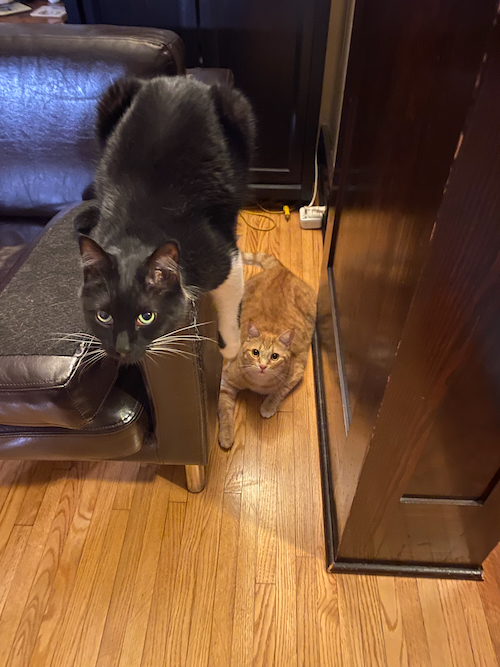
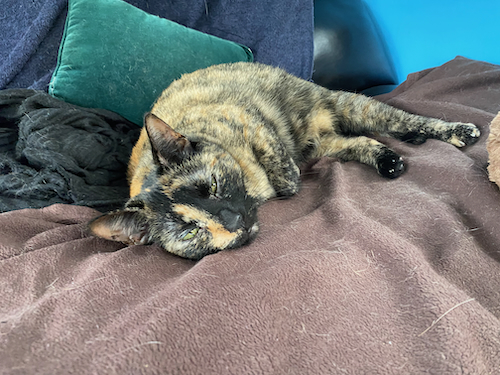
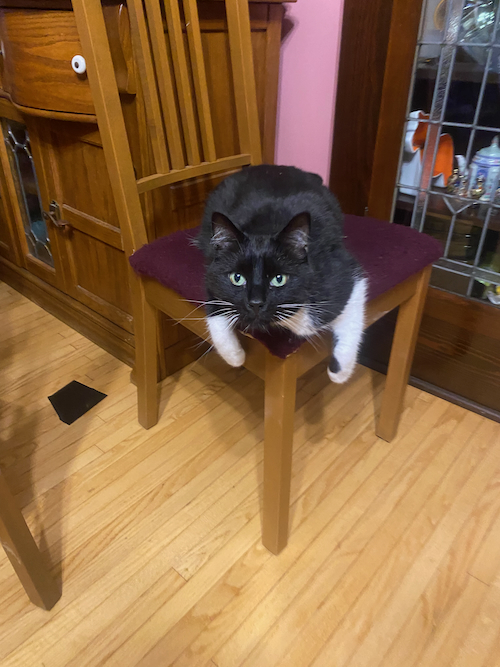

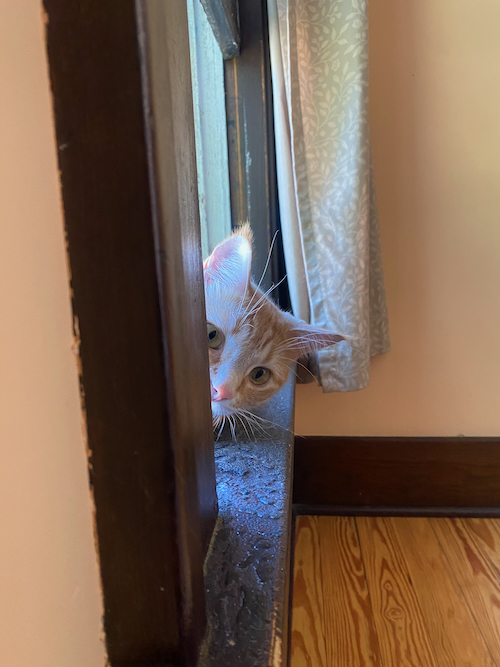
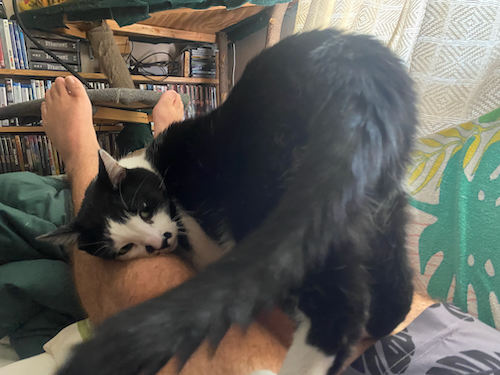
Recent comments